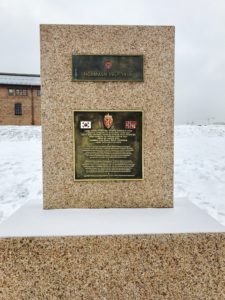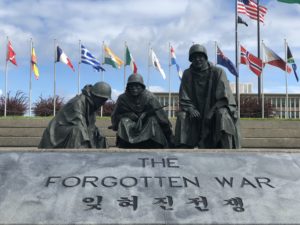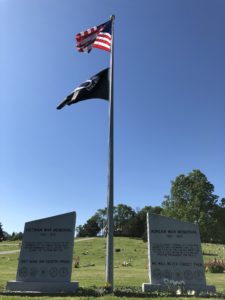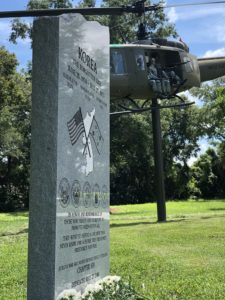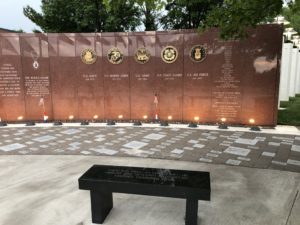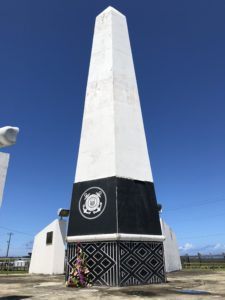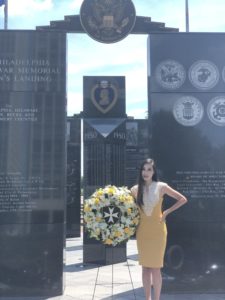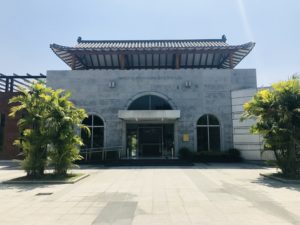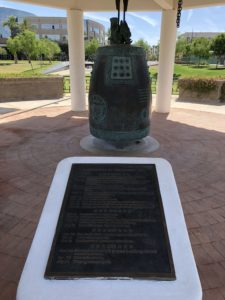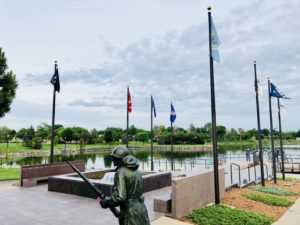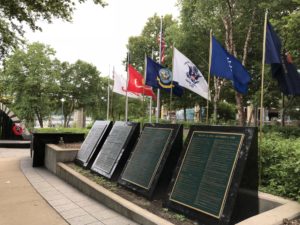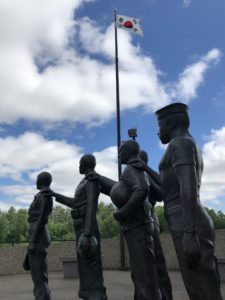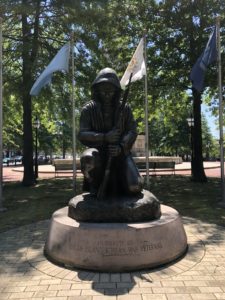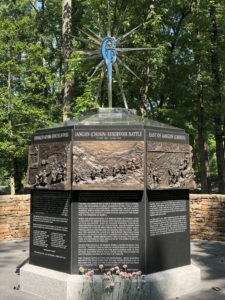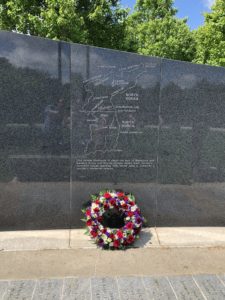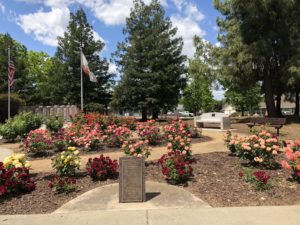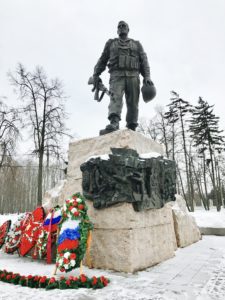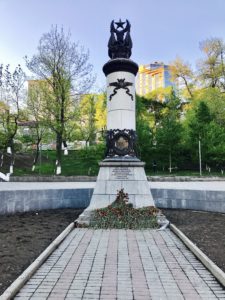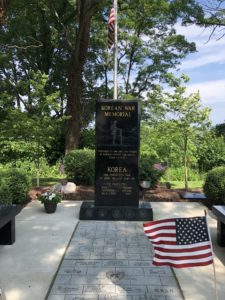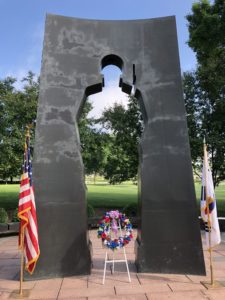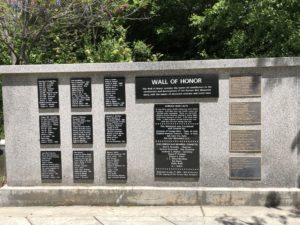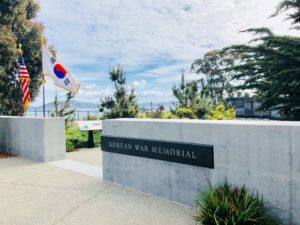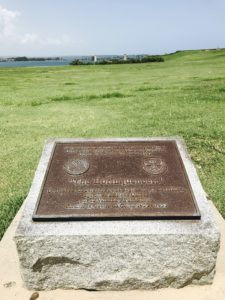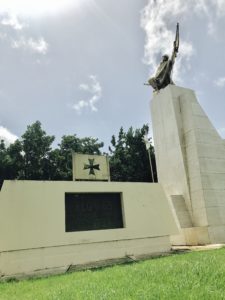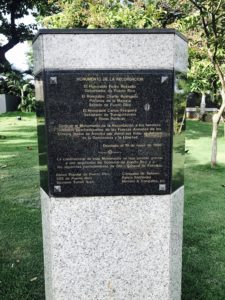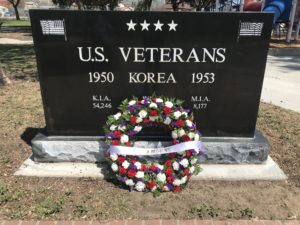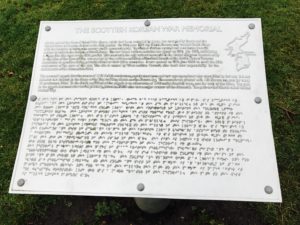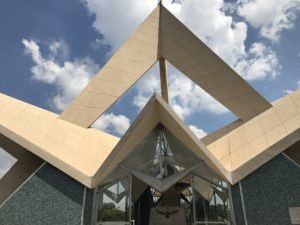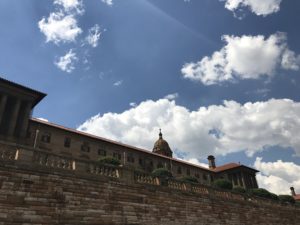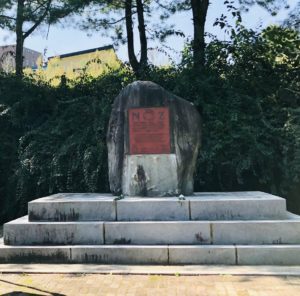>> Hello, everybody. I am back at the Belfast City Hall where the Korean War memorial proudly stands. I am here with the last remaining Korean War veteran, Grandpa Albert. Say, "Hello," and Ms. Carol Walker, who's been extremely instrumental in arranging everything today. She will tell you the story behind this memorial, how it got here and that there is another memorial in Korea, in Seoul, that honors the Irish Korean War veterans. So Ms. Walker ...
>> Hi.
>> Should we do a little ... We're going to loop around and then show you, so I just want to show you ...
>> We just stay here.
>> ... how it looks like. It honors the Royal Ulster Rifle, and, again, I love this inscription where it says, "The people that walk in darkness have seen the great light," from Isaiah, chapter nine, verse two, and then another ... So there's three sides that honor different ... So we're going to face way because I think this is prettier, so okay. So Ms. Walker, tell us how this memorial got here.
>> Well, this memorial used to be in Korea. The soldiers themselves and [INAUDIBLE] Battle of Happy Valley. Actually ...
>> Speak up.
>> Oh, speak up? At the height of the battle in Happy Valley ... Afterwards, they decided, the commanding officer decided they [INAUDIBLE] something to commemorate the sacrifice of the 157 men that had made this great sacrifice at that particular battle, which as you can see from the memorial, it was on the 3rd and 4th of January 1951, so the padre set out on a task to go and find something, and he managed to come across a Korean stonemason.
>> Mm-hmm.
>> And they were able to get this beautiful pink Korean granite, polished granite, and create a memorial. It was on the field at the site, the battle site at Happy Valley on the 3rd of July in the 1950s, 1953, and at the service, there was a service that took place, and many of the soldiers themselves attended it, and they had the padre at the time, and he performed the sermoning, and the words that are on the memorial that you said, Isaiah, he actually used them as part of the scripture during the service that day and during the sermon, in the remembrance sermoning. Also they laid wreathes at the time, poppy wreaths like Albert has just laid.
>> I do want to show this.
>> They laid these wreaths to commemorate the 150 men that had made that sacrifice and that had died at the Battle of Happy Valley in trying to give Seoul the freedom.
>> Oh, yeah.
>> You can see ...
>> Yes.
>> ... it tells the story.
>> Oh, it tells the story. I didn't realize that before. That's wonderful.
>> But unfortunately, then what happened was after the Royal Ulster Rifles left Korea, there was nobody coming back to visit the memorial, and HMS Belfast, which is actually ironic that it was HMS Belfast, happened to be visiting Korea at the time in the '60s, '64, and it was decided then to bring back the memorial back to Northern Ireland so that the soldiers who were still alive from the Ulster Rifles could still have ceremonies and could attend remembrance services ...
>> That is awesome.
>> ... for their comrades. So it was brought back onboard HMS Belfast. It was brought to the [INAUDIBLE] barracks which was in Ballymena, and it was positioned there. Sadly then, Ballymena actually closed as an army base, and the memorial went into storage for a while, but people like Colonel Charley and Brigadier McCord at the time were instrumental in making sure that the memorial went somewhere important and had the honor that these men had bestowed wasn't forgotten, and the memorial was actually then given this very prominent place here in Belfast, and it has progressed over the years. It's been looked after. As Albert said, you know, there was a new path has been put in. People are able to come here and visit it, and the Ulster Rifles Association will come here and will hold memorial services and still remember the war dead oftentime.
>> I guess I just want to show you that they put up that gate especially for this, you know, walkway because technically, this area right now, there's no pathway. That's the City Hall, and it is in a very prominent location.
>> And it's so close to the cenotaph which is Belfast Cenotaph that's here to commemorate and honor the war dead of the First World War and the Second World War, and so it's still fitting to have it ...
>> Very fitting.
>> ... to have it so close to the cenotaph.
>> So over there, Ms. Walker, pointing out the cenotaph honoring those who died in World Wars I and II, and it's literally ... You can see it from here, and this memorial is right here, and I just wanted to thank you because the one that's filming right now is the daughter of Colonel Charley, who was not only instrumental in getting this here, but in Korea, they now have a memorial honoring the Irish Korean War veterans. It's in Seoul.
>> It's in Seoul at the National Museum, at the museum, because it's a very fitting site. It's where there's also memorials are from the Canadians, and all the other Commonwealth countries have now started as well on the back of what we did and what the Irish did with their memorial, and there's other countries, you know, from the United Nations have placed their memorials that are in a war memorial garden, and it means people can go and commemorate. The good thing is that every year, as well, the Irish, the Irish Embassy, still hold a remembrance service there and for people, so it's not forgotten. [INAUDIBLE] memorial, we spent a lot of time working out [INAUDIBLE], what shape it would look like, how the memorial would come about. It was decided that it wouldn't be a replica that we had here because it needed to reflect as it is today Ireland's [INAUDIBLE].
>> That's true. This was erected in 1951.
>> And the Ireland that we are in today and we were in in 2012 when we started with the project was a very different Ireland. It was an Ireland that had started to come through the the peace ...
>> Aw.
>> ... process.
>> Oh!
>> [INAUDIBLE]
>> Oh!
>> I'm cold!
>> I don't want him to freeze. This is Grandpa Albert, everyone. He's 91 years young, and his memory is impeccable, right? Oh, before we close, see, I wore this rifle green to match him, but can you sing [INAUDIBLE] for us?
[Lyrics]
[INAUDIBLE]
>> Yay! Ninety-one years young. He's the last remaining Korean War veteran in Northern ...
>> Well, one of the ... One of the last.
>> One of the last Northern Ireland ...
>> The last Irish one.
>> Yes.
>> He is.
>> An Irish one. Many have passed just in the past month ...
>> Yeah.
>> Yeah.
>> That's it.
>> ... including Colonel Charley and ...
>> Uh-huh.
>> And many of the veterans that we were able to take back to Korea in 2013, many of them passed very quickly after their trip back ...
>> Yeah.
>> ... when you think about it.
>> So I want to thank you because actually Ms. Walker is part of a different organization and association that remembers and honors those that died in World War I, right?
>> Yes.
>> Yes.
>> World War I and World War II.
>> World War II.
>> And the Korean War as well.
>> Yes. So thank you for bringing the [INAUDIBLE] as well of their memories, and thank you again to Colonel Charley's daughter, yay, Katherine, who is filming this video. So, everybody, thank you so much for joining me in both Ireland, all of Ireland now ... I will be on my way to Wales, so thank you. Thank you. Bye!
>> I think it was either [INAUDIBLE] and we stayed and ate there. Now when we stopped, during the summer months, these people [INAUDIBLE] and the ground [INAUDIBLE] stacked up during the summer to dry, and then at the end of the summer, they bring it in and stack up, say, the houses. Now these would be cottages [INAUDIBLE] and they stack them up. That's the fuel for the whole winter. Now having said that, the same applies in Korea. You know about the [INAUDIBLE]. You know the [INAUDIBLE]?
>> No.
>> [INAUDIBLE] famous thing in Korea, two hands to make a forklift, and the person has a stick with a hook, and when he goes out, he pats it on the ground, and he puts a hook on it and sits there, and he goes around, and gets all sort of stuff, jungle grass or twigs. Anyway, at the end of the day, a pail of stuff, and he'd go back to his cottage, and he'd put all that stuff beside the house. Now that was the winter fuel. Now cooking, they just have the one room, and at the back, they have a kitchen, as you would call it. Now the kitchen comprised of a roof and two sides. The rest was open. Now let's just say the house was [INAUDIBLE]. They have their cooking utensils, like two or three pots, and that was permanent there. That's where they cooked. Now all that stuff is there for the fuel to light the fire and do their cooking. Now I observed this before, seeing what they did, and luckily I had matches, and I got some of the fuel and put it on and lit the fire, and what happened was, the Koreans were very well advanced on the floor heating. Well, as soon as we lit that fire, all the heat went underneath, as well as cooking. It went underneath and heated the floor. Now the floor was big clay again and big clay I say. Holes were there for heat for ages afterwards, and what happened was, the smoke that went out through the back of the chimney, whatever it was, and inside about 1/2 an hour, and it was freezing while were in there, 1/2 an hour. We'd take our jackets off [INAUDIBLE]. It was so primitive but so very good, and that just shows you the ingenuity of the Korean peasants. I'll never forget it. You have your cup, which was aluminium, and you also had what they call a Tommy cooker. A Tommy cooker came in a wee square box of cardboard, and we took this wee metal thing. We [INAUDIBLE] could put either your mess tin ... I don't know whether you know what a mess tin. It's what you cook in, individual cooking. There's two parts, and you do your cooking and that sort of thing on the wee stand with something like if you remember fire lighters to light a fire. Well we had wee small tablets, and they didn't create any flame [INAUDIBLE] just a like a glow, and you cooked your food in that, and that's how you have on the field. Everything was there for you. The Americans' rations was far superior to ours, oh, yeah.
>> How about the cold? Do you remember the cold?
>> Oh, yes, very much so, yeah, mm-hmm, yeah. Not only that, when we went out there, we just had ... It's hard to explain, so you'll need to see pictures. We just had what they call a [INAUDIBLE] a tunic and trousers [INAUDIBLE] sort of thing, and the Americans and all these other things and Canadians, they had their combat suits and their liners inside, if you remember liners. You could zip them out in the summertime and put them back in in the winter. We didn't have that. All we had were ... You'll see a picture of a red coat. We called it a red coat, like a topcoat and your battle dress, and that's all you had, and whenever we got wet, that was just too bad. [INAUDIBLE] in good weather but nothing in the winter. We were ill-equipped, and not only that, but we only had weapons. [INAUDIBLE] was our main weapon, a very good weapon, automatic fire, and then we had a rifle, .303 Lee–Enfield, a very famous weapon, but it was one action. You have quick-fire. You had to keep loading and unloading every time, and you had a magazine of failed rounds on the rifle. No, no, I never had any Korean food.
>> Oh, even now?
>> Oh, I have tried it on the way out to Korea [INAUDIBLE]. I thought it was [INAUDIBLE] asked me, "Well, do you want English or Korean?" So I tried Korean, but it was a bit too complicated. It's too much little tubes of different things to add, but I got through it. Having said that [INAUDIBLE] on the last day of our last visit in May there, I forget the name of the [INAUDIBLE]. As I recall, it was a woman, and she had a seven course meal for us on the [INAUDIBLE] before departure and through seven courses, and you would hardly see what was on the plate, and it was very good. It was different what I got on the aircraft.
>> Korean food at the time, but did you try Korean liquor at the time?
>> No, the only thing we got was two battles a day of Asahi, Japanese beer.
>> Oh.
>> But having said that [INAUDIBLE] as it seems a terrible ship. You had a hole in the wall, just like the hole, square hole, a square in the wall, and you were issued out two bottles of Asahi beer. That's what we got.
>> Oh, I would have never guessed that. So no soju, huh, no Korean alcohol?
>> No, no, it was all Asahi beer.
>> Oh, okay. Do you think you'll see a unified Korea in your lifetime?
>> It's hard to see. I would like to see it. I would definitely like to see it because it's a [INAUDIBLE] having the knowledge of what has went on there, the starvation. Even the soldiers not being able to get [INAUDIBLE] and the feeling of the children and all those big pompous parades with their machinery and rockets and what have you. It's a terrible site.
>> Well, I'm hoping for peace not only on the Korean peninsula but in all of Ireland as well.
>> Uh-huh, thank you very much. Ten o'clock, 22 hundred hours, and what happened was, as we were going out [INAUDIBLE] and we're going across, and I remember going up this hill here, and I went in the dark and the windscreen I could see ... Sorry. It was heavy gunfire, consolidated gunfire, and you see the tracer bullets on the reflection of my windscreen, and I said to the guy who was with me, "This is good." [INAUDIBLE] our tanks, centurion tanks, and I said to the guy with me, "This is good. They're giving us covering fire to get out." What happened was, I found out later that the medical officer and his driver [INAUDIBLE] was quite some distance behind me. Apparently the Chinese had did a horseshoe movement. Instead of coming across, they came that way, a horseshoe movement, and closed it, and the people behind me, that was them trapped and taken prisoner of war. I'll never forget that. I'm surprised you don't know about the
[INAUDIBLE] is famous.
>> ... the door who had been captured and could walk over the UN forces with them, but the UN troops, the Astor Rifles and the others who were with them, who had been killed were just left to lie, and they weren't buried by the cruiser, and they went out, and in this hard, harsh ground, they buried the bodies because they felt they needed to give respect to these people from overseas who'd come to fight for them, so it was very poignant, and then we were told how after the ... What we were shown were the ... Albert showed a picture earlier of the bullet holes on the bridge, which another Astor Rifleman ... I think it was a lieutenant then, Merv McCordy, went on to become a brigadier eventually. He got an MC, a Military Cross. Himself and somebody else protected a sort of area and ... two of those who had died in Korea, and they ... I discovered when I was back recently in Korea that near that side of Seoul is where all the monumental memorial makers were, and so that's how they managed to find ...
>> [FOREIGN LANGUAGE]
>> Yeah. The Padre found ... was told to go and get a stone, and he found a stonemason as well. Apparently, they were in the back of an army truck. I assume he was paid, and they drove around with the ... wherever the battalion was going, and he was told to carve on this memorial to remember the Royal Astor Rifles and the others who'd been there and then in Happy Valley and who'd died there and others of the Regiment, who'd died nearby or elsewhere in battles that included Imjin because the Astor Rifles had heavy casualties at Imjin as well, and that was dedicated July 1951. My dad wasn't there because at that stage he was in Japan training people to go to Korea and things, so he wasn't there but some very famous, very poignant pictures of that. That memorial, we will see later. It came back to Northern Ireland in the 1960s, put up in Palace Barracks ... not Palace Barracks, sorry, the barracks by Mina where the Regiment, the Astor Rifles, had their depot, and then that closed in 2010, and it got moved to outside the city fort here in Belfast, and my father, Merv McCordy got the MC in career, and a lot of the others of the Regiment were very instrumental and moving in that getting it placed outside the city hall, and it's been recently refurbished, and we've now got access to it from the Cenotaph area, the city hall, and they're looking after it well. So my dad and I went back to Korea in 2011. Mr. Kim showed us around Happy Valley, and my dad, I think he never totally said this, but I think, to me, but I think he always felt guilty that he'd survived, and so many hadn't, and he really wanted to do something to remember those who'd died in Korea of the Regiment, and initially we were thinking about putting up a wee plaque or something in Happy Valley. We spoke to the British Ambassador when we were there. We spoke to Mr. Parker when we were there. When we came back, we spoke to members of the Regiment because obviously it would have to have regimental approval, and then when we were sort of just ... We were just thinking of doing something quite small, really, maybe in Happy Valley itself, and then I got ... We met Andrew Salmon out there. He'd already met my father. He'd been to Belfast 2 or 3 years before to interview my dad for his book, "To the Last Round." He interviewed quite a lot of the Royal Astor Rifles for that, and he was delighted to see my father in Korea. They got on very, very well. They enjoyed going out and both good storytellers, so they could sit around and drink and tell stories, top teacher, he was, with the stories. But anyway, Andrew Salmon sent me an e-mail and said that the Irish Association of Korea and the Irish Embassy in Korea were thinking of putting up a memorial in Korea to those from Ireland who had died in the Korean War, and because although Ireland wasn't a UN nation, it ... People from Ireland had thought and for the Americans, the Australians, and then many of people from the south of Ireland were part of the Royal Astor Rifles, which was a British Army Regiment, so it was part of the UN. So and they were also wanted to remember some Padre, some missionaries who died in Korea as well, and there's a link there with the Royal Astor Rifles too, which I'll explain in a wee minute. So anyway, we then started liaising with Ambassador McKee, and again, we had to get approval from the Regiment and from the British-Korean Veterans Association, and there were links between Dublin and Belfast and everything else because obviously, we have these politics involved in this country too, and in among that, that's when Mrs. Carol Walker came on board because my mother used to ... my mother? My father used to be ... He was very much behind the setting up the Somme Association, the Somme Museum to remember those of the First World War from the north and south who'd died at the Battle of the Somme in 1916, and he knew that Carol had a lot of experience in memorials. She put up memorials for the First World War in France, in Turkey, in visitors places. I'd asked her initially for advice on that, and then discussion began about taking back veterans from the Royal Astor Rifles and from Ireland. Generally, Carol has had experience of taking back First World War veterans to First World War battlefields, and so that's how she become involved in the ... on the team, basically, and then a representative of the Royal Irish Regiment, the modern regiment for the Royal Astor Rifles, which the Astor Rifles, my dad's regiment in 1968 amalgamated with three other regiments into the Royal Irish Rangers, and then in 1992, that became the Royal Irish Regiment, and they're very supportive of their heritage and interested in their heritage. So lots of discussions about the memorial, lots of liaisons between Korea and Ireland and phone calls at 7 o'clock in the morning and to work with the time difference, and then in 2012, Carol, myself and Trevor Ross, who was representing the Royal Irish Regiment, went out to Korea at the time of the Commonwealth Veterans revisit the following year and met with the British Ambassador, the Irish Ambassador, members of the MPVA in Korea, went to see possible memorial sites, and it was then that it was decided the memorial should ... the key memorial should go up in Seoul because it'd be easier to look after it there by the War Museum and things, and the Irish Embassy said it was look after it and that there would be a panel put up in Happy Valley as well to remember the battle in Happy Valley too. 2013, and you'll hear more about this from Mrs. Carol Walker, the memorial was dedicated in Seoul. My father and I were meant to go to be there for that dedication and for all the other events and be there with the other veterans from the Royal Astor Rifles and from Ireland. Unfortunately, my mother had a very severe stroke just a week or two prior to us going out, and we, anyway, my father and I couldn't go. She died shortly after the veterans returned from Korea, but we were very close in contact with what was going on. My dad was very keen to know. He kept saying, "Have you had a signal from Carol?" because he's not quite into e-mails, but a signal, and so Carol, Trevor and the others sent back information of what was going on, sent photographs of the memorial being dedicated, being put up and everything, but me and my father were ... My father and I were very evolved with Carol and others, and everything had to be approved with the wording on the memorial and everything else. Then with regards to the memorial, my dad ... One of the sides of the memorial, one of the sides is the Royal Astor Rifles and reflects this memorial here in Belfast and the wording on the memorial here in Belfast, and it particularly mentions Happy Valley. Another side mentions those Irish birth and heritage. Another side is ... talks about seven missionaries from Ireland, who died in Korea, and one of those missionaries, my father actually knew. Father ... I think he's known as Father John O'Kane, is it?
>> It's O'Kane.
>> Yeah. Father John O'Kane, though, my father knew him as Father Jack. Quite often in Ireland, people who are called John are known as Jack, very confusing. Anyway, so my father knew Father Jack. He'd been a Royal Astor Rifles Padre in the Second World War. We think he might have been at D-Day with them, but we definitely know he was with the Royal Astor Rifles in the Second World War. He was older than my father, maybe 10 years older than my father, and then after the war, my dad was in Palestine and Egypt, and he was the Catholic Padre with the Regiment there. The Royal Astor Rifles has a Catholic Padre and a Protestant Padre, and he was Catholic Padre in Egypt, and he remembered him because he was a Padre. He was part of the officers' mess. He had a tent, himself, I think, because he's a Padre ... had his own tent because my father had to share a tent with somebody else, which are all the boys who are over there, had a lot more in the tents, and he remembers them being very good at cards. He remembers them being a lot of fun. He remembers them riding around the camp on a motor bike, and all the guys thought he was wonderful, so my father was very sad when he'd heard that he'd been killed in Korea. He knew he'd gone out to Korea as a missionary, and so that's a link between the Astor Rifles and the others in the memorial as well. Then in 2015, this ... the ...
>> My name is Adrid Fieren. I am a man of 85 years old. I served in the Korean War with NORMASH in '52, '53. NORMASH was Norwegian contribution among the nations that helped South Korea to defeat the North Korean War from North Koreans. NORMASH is a mobile army surgical hospital. The main purpose for NORMASH is to take care of soldiers directly from the front line, wounded which has to be X-rayed and to be operated by surgeons. NORMASH therefore was placed approximately 10, 12 kilometers from the [INAUDIBLE] front line. We were a part of 8th Army and had, as far as I remember, three divisions to serve soldiers from. Soldiers coming into NORMASH was treated there and had to leave before the 3 days. Then the patients had to [INAUDIBLE] other hospitals. NORMASH was served by, I think, approximately 600 people from Norway. Each continent each period of 6 months, and then 106 persons on each period. I was in the guard, controlling all together with then all the Norwegians, and our duty was to guard camp to serve the borders. What do you call it [INAUDIBLE]?
>> Barbed wire.
>> Hmm?
>> Barbed wire.
>> Barbed.
>> Wire.
>> Wire but [INAUDIBLE] to be in the main gate all 24 hours. Together with [INAUDIBLE] Korean soldiers, a soldier from ROK Army. AMASH, the main thing in AMASH is of course the hospital itself, but it has many service functions around [INAUDIBLE] transport service in the camp, guarding and so on, and we had, I think it was approximately 30, 40 ROK Army Koreans [INAUDIBLE] guarding people. I think there were approximately 15, 20 and [INAUDIBLE] to maintain the camp itself. Then the nights especially in the guard, we were two then, one Korean and one Norwegian. We had difficulties, of course, with language, but we tried to communicate a little. But one thing we learned each other, that was a song. The Korean has a folk song called [FOREIGN LANGUAGE] and the Korean colleague on guard, the Korean learned us [FOREIGN LANGUAGE] and we learned him [FOREIGN LANGUAGE] a Norwegian folk song, and the [FOREIGN LANGUAGE] we learned goes like this. [Lyrics] [FOREIGN LANGUAGE]. A little like that, we learned, and perhaps in Korea, an old man of 80, perhaps he's singing [FOREIGN LANGUAGE] maybe. Why did I go to Korea? Well, I was already 20 years old. I had finished first military service in regularly in Norway, and we were all volunteers, and on that time, I nearly didn't know where Korea was, but I had to look up on a map and find the little country called Korea, but it was the adventures, one thing, to travel all around and half around the world. I'd never been in plane before. I'd never slept in a hotel before. It was new adventures waiting, maybe a little to take part in a battle against communism, but I wouldn't say that was the main thing for a young man on that. However, it turned to be a very fine trip. Six months after the War, Korea is one of ... We used to say that no other country in the world is so clever to say, "thank you," [FOREIGN LANGUAGE] as ... You know [FOREIGN LANGUAGE]? Norwegian ... as the Korean. I am so happy that I have been four times back on revisit trips.
>> Show us that picture where you went to Korea and that story of the nurse and the patient.
>> Yes, that's a good story. You see here we have a book which we, the veterans in Norway, has made possible, and it is also translated to Korean, and here, I can show you one picture. No, it's not here. It's in the magazine from one of the revisit. This was celebrating the 60 years of peace.
>> Armistice.
>> Huh?
>> Armistice.
>> Armistice, yes. It's not peace yet. There we had a nurse who served in the very first continent in '51, and she was taking part in that trip and [INAUDIBLE]. You see this? That's a lady. Her name is Gerd Semb. She is now a lady of 95, I think. When we someplace on that trip, I think it was in Uijeongbu, we had a lunch there, and when finished her lunch, going out, there came a man, this man to Gerd and saying, "Ah, I must thank you. I was young man, and I had destroyed my face, and you treated me." After more than 60 years, it seems this happening. That was a very funny and a very good story.
>> You're on the cover of the magazine.
>> Yeah, this is the magazine for the Norwegian forces.
>> With Gerd.
>> Yeah [FOREIGN LANGUAGE] is the name of this.
>> Who are the other two ...
>> Here is also the lady there, yes.
>> And who is the other lady?
>> And if it is of interest, this is me, and this is the Minister of Defense in Norway at that time. She also followed this trip.
>> So what did you think about Korea?
>> Now or on that time? At that time, Korea was more or less a ruin. In the place where we were situated, the battles had gone four times through, so it was no houses, no buildings, all destroyed. The people who were there lived in houses built of soil and equipment they held after the battle. Especially fort making ceilings on their houses, they took boxes of beer and open it so it was more like this. If you took the bottom and the top of a box of beer, you will have a flat metal, and many of those was how they built the ceilings, top of the ...
>> Roof.
>> ... roof, yes. Nowadays, Korea, the first time I visited was in '84, I think. It was a new modern country. It was unbelievable for me to come back and see this wonder, and the Korean people, I love them. I really love them.
>> Number one.
>> Number one, they are number one.
>> That's number one.
>> And we have been so happy. We have this veteran association to have a very, very good connection with the Korean ambassador. He is number one. So I think me and all the other Korean veterans also are very fond of the Korean people.
>> Well, we thank you.
>> Thank you.
>> [FOREIGN LANGUAGE].
>> Enough.
>> My name is Fillmore Kent, and I am 85 years old, and I served in Korea from November '53 until November '54. That was the last two continents in NORMASH history. I volunteered, as everybody who served in Korea. The reason why the Norwegian, Trygve Lie, was the first general secretary of UN starting in 1946, and it was very much publicity around the Korean War in Norway at that time. So, of course, I wanted to help. Also, it was an exciting because you cannot imagine today how far away Korea and Norway was. The second reason, or the third reason, was that I needed money to start my study in Germany, and the salary was partly paid in Korea and partly in Norway so you can save. We all had 6-month contract. I renewed my contract after 6 months, and that's the reason why I spent 1 year in Korea. The reason why I was picked out was that I had some first aid courses in Red Cross, and I was already a laboratory man, so I first picked out to serve at the hospital laboratory. When I came down, the position was occupied, so they put me as assistant to the operation tent. It was quite a new experience for me, but I learned rather quickly, and you get used to it. It was after the armistice, but we still had very many military patients but gradually fewer army people and more Korean civilians. After the 6 months, we had the opportunity to travel down to the hospital in Busan, the Swedish hospital, permanent hospital, so we get to know very much some Swedes. We had also very good relations with the Koreans in the camp. We were close friends. I have a theory in that aspect, Korea is a rather small country dominated by China and Japan. Norway is also a small country, dominated for centuries by the Danes. Norway was just a farmer's country with no education. If you wanted to have education, you had to go to Copenhagen. Later, we were under the strong influence by the Swedes, so my theory is that Korea and Norway have more or less the same history, even though they are opposites of the world. In April '54, NORMASH also engaged six Korean nurses already educated to help out because of the many Korean civilians, and I got to know one of them, and she came to Norway in '57 for further education and to meet me. We married in '61. We are still married. We have three children and eight grandchildren. So for me, the Korean event influenced my whole life afterwards. My wife is really happy because it's very important for Koreans to have a family and some success, so she's quite satisfied in her life also.
>> I would love to see her picture. I would love to see her picture.
>> I not here.
>> Oh, wow. Fascinating. You went back to Korea, you said, for a visit, right?
>> Yes.
>> How many times?
>> Yes. I think after ... These are the 30 years after the armistice. Koreans started the revisit tours, and I have been in Korea twice, in '83, so after 30 years, and in 2010. It was very surprising to get to come there and see that the fort is still ready to shoot after 30 years of armistice.
>> Even now?
>> Even now. But I mentioned the Busan hospital Swedes. As I told you, we got along, Swedes, very good, and they were both countries who had commission in Tongduchon to secure the armistice, and they still are there, I suppose, so we could visit them very early in 1954. I'm also a board member of the Korean War Veterans Association in Norway, and we have two events yearly here at the memorial statue. In June, the military attache located in Stockholm comes to pay tribute to our dead, and in the second Friday of November, we have our annual meeting.
>> Don't touch that. With your hands, don't ...
>> Oh. Oh. Okay. Sorry.
>> Okay. Say that again about your Association reunions.
>> Huh?
>> About your reunions. Say it again. You have two ...
>> Yeah. Okay. I'll start from the ... Yeah. Okay. Mm-hmm.
>> [INAUDIBLE]
>> Now, the Korean Veterans Association have two occasions to remember the dead ones here at Akershus Castle. The first one is in June. The military attache for Sweden and Norway located in Stockholm, he comes to pay tribute. And also the second Friday in November, we have our annual meeting where we also have a ceremony at the statue, and our president [INAUDIBLE], he is a former officer in the king's guard, and he takes care of the ceremony with flags, with armed guards and military band. So it's a rather great experience for us.
>> Do a lot of people come?
>> Yes, because in our association, we also have members who served at the Scandinavian hospital in Seoul, which was created in '56 or something, so they who served there also are members of our association.
>> Do Korean Norwegians come, too?
>> Yes, of course, the embassy and the embassy staff and some Koreans, too.
>> How about young people?
>> Not so many young people, but my experience is that young people in Korea, they know very much about the Korean War.
>> More than other countries.
>> Yeah.
>> Well, what do you think, because the Korean War is called, "The Forgotten War"? The Korean War, they say, is "The Forgotten War."
>> Mm-hmm. Not for me.
>> Hm. You're right. So I'm hoping to preserve this history for young people, younger generations. I'm very glad that Julie is here because she is young Norwegian, and I want more young Norwegians to be proud of your service.
>> I can also mention that from 2010, Korea also invited grandchildren of veterans. So in the first tour, we had 12 participants from Norway [INAUDIBLE] from Norway, and they had 1 week in Seoul and Busan and 1 week marching along the line, so it was a really good experience for them.
>> Did your grandchildren go?
>> Yes. I had one grandchildren. Actually, I had two grandchildren now, and when I revisited Korea in 2010, I brought also another grandchildren with me, and [INAUDIBLE] grandchildren and also Lucy [INAUDIBLE] on Saturday if she had the grandchildren.
>> What did they think?
>> They were very happy, and of course, it was a great experience for the grandchildren, too.
>> I'm sure they were very proud of you. I think so, right? Because they see Korea now, right? What do you think of Korea now?
>> Now, as I already said, the frontline passed four times through Seoul, so it was nothing left when we arrived, so it's amazing how the Koreans can manage. They are very clever and very grateful, work very hard.
>> Yeah. We do work hard, and we're very grateful people.
>> Yeah.
>> We are very, very thankful.
>> Yeah. Mm-hmm.
>> We don't forget.
>> No, and of course, if you look to North Korea, you understand why you are grateful.
>> Yes. I say that I am very, very fortunate and blessed that I was not born in North Korea, you know?
>> Yeah.
>> So I hope that, you know, you went, and you defended South Korea's freedom, right? I hope that the war will end soon and Korea would finally have peace and reunification so that North Koreans can also enjoy freedom. Do you think that's possible?
>> Doesn't look that way. And, of course, Germany was divided in the same way, and it ended, but you can still see a difference between West Germany and East Germany, even in Berlin. So it's not easy to combine West Germany and East Germany, still some problems, and I suppose in Korea, it must be even more problems. But of course, I will wish you good luck.
>> Yeah. I hope so, too. Anything you would like to say to maybe young people all around the world about war, peace, about your experience in Korea?
>> No. I don't think so.
>> No? Well, thank you so much for your time.
>> Okay. Okay.
>> You have from there, the German, Norwegian soldiers in Germany after war.
>> Okay.
>> And we have those from Sweden, if you see, to Sweden, the Korean, Norwegian Korean there in the middle.
>> Okay.
>> [INAUDIBLE].
>> Do you read Korean?
>> Yes.
>> Yes.
>> NORMASH, 1951 to 1954, wow, 623 Norwegian ... More than 90 patients.
>> Ninety thousand, 90,000.
>> Ninety thousand, I mean, 90,000. Were any Norwegian servicemen or women killed?
>> Three of them.
>> Not in battle, not in battle.
>> Three?
>> But not in battle but in service.
>> Accidents.
>> Accidents?
>> Yeah.
>> What kind of accidents?
>> Driving accidents.
>> Driving ...
>> In Korea?
>> Yeah, yeah, during the service, yeah.
>> Oh, no.
>> And the third one is a Norwegian sailor.
>> Sailor, yes.
>> Because when the Korean War started, a lot of Norwegian ships were in the area, so they worked with evacuation of civilians from the war zone and also the transportation of heavy military material from the fan to Korea and back to Japan for repair also.
>> So ...
>> But it's not so well-known.
>> I only thought ...
>> We have written about it in our book.
>> I only thought doctors and nurses went from Norway.
>> Oh, no, personnel too. To run a MASH, you need more than doctors.
>> One hundred persons in total.
>> One hundred and six.
>> Sixty of them working in the hospital.
>> Each continent, 106 persons.
>> And the very necessary addition ...
>> Cooks, cooks, guards.
>> Drivers.
>> Drivers.
>> Technical personnel.
>> Technical and camp workers.
>> But ...
>> And in addition, 60 Korean too.
>> Yes.
>> Really? So ...
>> About 25 Korean guards?
>> Yeah, approximately.
>> Approximately.
>> And four were working in the camp.
>> And civilians too.
>> So 100 medical personnel?
>> Yeah, yeah, and the MASH consists of 100 persons, Norwegian persons.
>> And 523 other servicemen from Norway because there were 623 total.
>> Yes, in total.
>> No.
>> All Norwegian were volunteers.
>> Each continent ...
>> Yeah, continent, yeah.
>> ... for 1/2 a year, and we had six continents.
>> Seven, seven.
>> Seven at all, and they changed every 6 months, and each continent had 106 persons, personnel, and of those, approximately 40 medicals.
>> No, 60 medicals.
>> So many?
>> Yeah [INAUDIBLE].
>> [INAUDIBLE].
>> It doesn't matter, doesn't matter.
>> And of course, the medicals, the hospital is the main thing of a MASH, of course. MASH stands for Mobile Army Surgical Hospital, MASH.
>> There's a very famous TV series in America.
>> We have seen that.
>> Comics.
>> What do you think of that?
>> The scenery is very natural. I don't know where it's taken, but it looks like Korean scenery.
>> Yeah.
>> And the tents and everything is very, very close to ...
>> Real?
>> ... real, yeah.
>> And you see here, NOR, that stands for Norway, MASH.
>> And if you behaved well, you could have a new contract for 6 months. I behaved very well, so I stayed for 1 year.
>> One year, but why ...
>> He didn't behave so well, and so he stayed for another 6 months.
>> You all volunteered.
>> Yes, we all were.
>> Everybody was volunteer.
>> Wasn't it difficult? Why did you want to stay longer? Wasn't it difficult?
>> To stay longer? No, no, I had service after the war or armistice.
>> Approximately 100 stayed more than ...
>> Yeah.
>> ... 1 year.
>> Yeah.
>> Six months, 1 year at all. It was a good pay, you see, after Norwegian conditions, and so it was ...
>> To be honest, I had three reasons for going to Korea. First of all, Norwegian Trygve Lie was the first general secretary of United Nations. He was well-known internationally because Norway had a foreign administration in London during the war, and so it was very much first about Korea and the Korean War. Of course, I wanted to help. Secondly, it was very exciting, so exotic.
>> Yeah.
>> You cannot imagine today how far it was from Norway to Korea and how different the societies were, so it was excitement, and thirdly, I needed money for my study, and we were not so very good paid, but most of the money was in Norway.
>> Yeah, yeah, yes.
>> And we had a small salary.
>> Scrips.
>> Yeah, scrips.
>> Money valued only during war, Korea.
>> Yeah, and the scrips started all in first World War, I read once.
>> Yeah, special money.
>> Yeah.
>> Well, I am Mr. Maximo Young, 94 years old. Well, my war experience started with ... I was working with a company in the Philippines. That was 1941. Later on, I was sent to States to study agriculture, and then from there, I was one of those chosen to select members of the group that our government committed to be sent to Korea. That was 1950. Now initially, before we were sent to Korea, after selecting different members to compose the 10th Battalion Combat Team, we had some training. Our training ended sometime on September, so on September 15, we made our first trip to Korea aboard [FOREIGN LANGUAGE]. We left the Philippines September 15 and arrive at Korea 19 September. Upon arrival at Korea, we could see the whole area, stationed in Pusan where we landed. There were all of us armed for war. It was this time when the North Koreans invaded South Korea on 15 September the same year. So upon arrival at Pusan, our initial debarkation area, we were sent to [FOREIGN LANGUAGE] for a probation period. From there, we stayed for overnight, and then the following days, we were sent further north to acclimate ourself with the area, including the weather. The weather is very different. It started while in Korea. It was always frigid, very cold. We stayed there for almost 15 days. From there on, we were attached to a US division, the 3rd Army Division of the US. From there, we were assigned an area that is south of Seoul, extending up to about 15 kilometers north of the 38th parallel. We were assigned to patrol an area which is the main line of supply used by the United Nations coming to transport men, soldiers and supplies to the front line. Now it was an incident where our group was designated to secure a certain area not to be a North Korean area. So November 11, we were sent to patrol the area to find out whether there are some North Koreans who are disturbing our supply road. Sometimes they're ambushing friendly troops and sometimes destroying vehicles that are a part of the group that fights the North Koreans. So on November 11, I was in charge of a group to reconnect the area going north. We were the first group to more or less move to reconnect the area. With us were some segments of two companies and some medical units and some support units. Now at 7:30, we left the area from somewhere in south of Korea, going to Yujeong, but our designation was to look for the enemy somewhere at [FOREIGN LANGUAGE]. Along the way, our head group encountered a land mine. The land mine exploded, and all the Jeep which they were riding exploded and flew over, and two of our men were disabled, but we continued moving forward to [FOREIGN LANGUAGE]. Now after completing a bend, going to [FOREIGN LANGUAGE], and an area which is more or less a distance from a hill, a hilly place, we encountered simultaneous burst of enemy fire suspected to be about of 4,000 deployed along that area. We were just little found out that place where we passed after were 45 areas in preparation for any ambush for any enemy that goes north. So since it was surprise attack, all of us would lie down, and then most of our men, cadet or not, because it was a very ideal place for ambush. It was river down the road, and the enemies were all deployed up on top the area. So after several bursts of fires, my men, our men, cannot move, so I was a commander of five towns. I was the fourth town. After a lull, I patrol the periscope. Anytime you have a periscope, you can see the area around you through a telescope without being exposed. I look left and right, and I found out not a single man what belongs to my group. We were about 90 to 100. All of them were flattened to the ground in that group. So as idea forward looking at the enemy, I saw some of them already more or less conferring to each other on the left side and off on the right side. Thinking on my officer [INAUDIBLE], I know they're ready to attack because nobody could fire. So what I did: I opened my tank. A tank, it has a cover. I open the hatch and went out and manned the machine gun with this part of the armament of the tank. What I did is, I cracked the .50-caliber machine gun and started firing from the left. As I continue firing, I saw some of them tumbling down, running, some of them getting out of their trenches. I swing the machine gun from left to right, aiming at those people who already were trying to plan an attack against us. I continue firing. I split about two boxes of ammunition until later on, the support fire coming from behind from our artillery. Now when I started firing, running after this soldiers who were getting out of their trenches from left to right, and after about 15 minutes, there was a support fire from behind. So after about 15 minutes, our soldiers started advancing, returning the fire. Incidentally, after that, we were able to more or less get them to surrender. After a head count, there were about 42 dead and about 201 dead. From there, we straight to [FOREIGN LANGUAGE] to complete our mission. That is the first time that we encountered the North Koreans from the Filipino side is the first time we encountered these North Koreans. Now after the incident, I found out there are foreigners from other countries who also belong to the United Nations command, went down to congratulate me for what I have done because without the fire, I think all of us would have been as good as dead because we can not know. Just imagine an area where all of them, you have the commanding view of the area, and all of us were down there like the pigs that are being shot at. That was the first incident I have encountered. That was the first incident where the Philippine forces encountered the North Koreans, and that was the first victory of the Philippine army.
>> What year was that? What month and year was that?
>> That was 1950, 1950.
>> '50, what month?
>> '50.
>> What month, month?
>> Oh, November.
>> That was during the most difficult battles.
>> Yeah, that was the most difficult.
>> November 1950.
>> Then from there, we went north, fought there, and then from there we found out that most of those ... There were 40,000 North Koreans stationed at the area. Now when we went there, all of them dispersed because of our combined attack. Aside from us, there were support units and some planes of the Allied that supported us.
>> Well, as Vice President of the Filipinos Korean War Veterans Association, what are some of the activities that you do as an association, and what do you think is important for people to know about Filipinos who fought in the Korean War?
>> Well, you're asking me about the different activities we did?
>> What's important about Filipinos in the Korean War? What's special about Filipinos? For example, Turkish soldiers, they never left the dead. You know?
>> Yeah.
>> So every country, there's something special about that country. So what would you say that you want people to know about Filipinos who fought in the Korean War? Like Thai, they were called Little Tiger. Yes. Something about Filipinos?
>> Well, the Filipinos, when we arrived at the Korea, we found that most of the civilians that they're fleeing because most of those Koreans, they are uneducated. That's partially the reason why the Japanese, when they occupied Korea, they prohibited Koreans to study, so more or less, never educated them. So during the time, whenever attack, they can not do anything. And what were we observed in Korea were civilians, they don't know where to go. Children, plenty of children, the children were left alone. They were alone. They had nothing, nothing to eat, especially the families.
>> So what's special about the Filipinos?
>> Well, what's special about the Filipinos?
>> Mm-hmm. Yeah.
[ Chatter ]
>> [FOREIGN LANGUAGE]. What was your role? What was your role that made the presence of the Filipino contingent, critical because of the war or important to the war? [FOREIGN LANGUAGE]
[ Chatter ]
>> A significant contribution.
[ Chatter ]
>> Well, first, more or less, fighting against the Koreans and then helping the civilians who are in need of food and protection, security.
>> I know Filipinos went to Korea even after the armistice, the 5th Battalion, right, went after, and it helped rebuild Korea.
>> Yeah.
>> Maybe that's a very significant contribution in the war that ... Many other nations, they left, but Filipinos, even after, they sent another battalion to help reconstruct. I think that's very significant.
>> Well, the contribution that was assigned to the Philippines after the fight, they were there to, more or less, study the nuclear activities of ... Well, the Americans told them something nuclear, more or less expecting the world will continue, but incidentally, there was an armistice that lured about 1953 where they declared ... They stabilized rations.
>> And I know there were 41 POWs, right?
>> I have the number. Excuse me. As a result, we have 112 killed in action, 112 killed in action, and then missing in action, we have 229. And then ... wounded in action, I mean. Missing in action is 16, and we have 41 POWs, prisoners of war. Now the 41 prisoners of war, after the war, we tried to verify, follow up, their destinations. Of the 41, we were able to locate, I think, 36, 36, 36, and until now, the remaining numbers are not found.
>> Really? Five of them are not found?
>> Until now.
>> Wow.
>> We suspected that they had died, and they were never found.
>> Recovered the remains?
>> Now, for the POWs, we have 41. I think 6 of them are not also accounted for. The others have gone back to the Philippines. After 3 years there was ... After the armistice, there was an exchange of prisoners, and some of them came back.
>> But not all?
>> Yeah, yeah, yeah.
>> Oh, no. The families of the POWs that never came back, so they're just waiting?
>> For your information, the total number of Filipinos that participated in the Korean War was 4,720.
>> Four thousand seven hundred twenty?
>> Four thousand seven hundred ...
>> No, I thought it was 7,200.
[ Chatter ]
>> I thought it was 7,200.
>> Oh, no. I'm sorry. Seven thousand four hundred twenty.
>> Yes. Yeah, and now in the association there are about 3,000, right, left in the association?
>> No. As of last June, I could account for 1,700.
>> Oh, that's it, huh? One thousand seven hundred.
>> One thousand seven hundred living.
>> Living.
>> Living. And the others, out of the 7,420, the others that came back was assigned to different places, and we have no means of contacting them. Now out of that number, as of now, our living veterans, verified living, is about 34 living veterans.
>> Thirty-four?
>> Yeah, thirty-four.
>> Thirty-four?
>> Thirty-four, yeah.
>> I thought you said 1,000 ...
>> That is for the Tampa City, for the Tampa City.
[ Chatter ]
>> Because there was five visitors when the ... The 10th was about ...
>> The 1st battalion that went.
>> Yeah, that's right, battalion.
>> Yes, yes.
>> The 1st battalion ...
>> There was only 34.
>> Yeah, 34.
>> And you're part of the 1st battalion.
>> Yeah, the very 1st battalion.
>> The 1st battalion are the oldest, right. I heard there's a 101-year-old veteran. One hundred and one, is he the oldest?
>> That 100-plus ... Most of the casualties were of the [INAUDIBLE] were because of another battle that was a year long. That year-long battle started way back in April 1952. That was the time the North Koreans tried to post in order to invade the South Korean.
>> Wow. One last question, have you been back to Korea?
>> Yes, five times.
>> Wow. Five times.
>> My son, he went there last year when it was awarded the highest spirit medal in South Korea. In fact, I will give you a copy of ...
>> A citation.
>> ... a letter. I wanted to take the award, for sure.
>> What did you think about when you first went to Korea? How did you feel?
>> Well, I was single dad during the time, and I was one of the selected because I came from Fort Knox to study the armored veteran. When I went to Korea, I never thought I would be coming back because it was the time when the North Koreans were very forceful in trying to invade South Korea. Now my impression about South Korea when I was there, it was a place where people are very poor. They were very, very poor. You could see them trying to get food from us, and mostly is what I said, most of the people there are uneducated, very poor, and they have no means of life except farming.
>> But now ...
>> Wow, terrible. The are the best shipbuilders.
>> Mm-hmm.
>> In fact, they intended to open up four shipyards in the Philippines so that they will continue to build ships because shipments is a problem. You can transport anything. Back then, it was very costly. Unlimited, but shipbuilding, I think that is what the ambassador told us one time when he said, it was 3 years ago, the ambassador of South Korea, we were having a meeting. The intention of South Korea is situate that the Philippines, which is very, very poor now compared to 1950. We were the second best country, but after the World War II, everything was destroyed including our factories, our everything. Now what the ambassador told me before was that the intention of the moment of South Korea was that within 30 years they want the economy of the Philippines to be in power with Korea. In other words, they will support the Philippines' infrastructure, agriculture, everything, so that way, 30 years, that was 2013. He said 30 years, that was the intention of South Korea. Thirty years from that time, they want the economy of the Philippines to be in power with South Korea.
>> I know. I visited too many countries, and when I went to the memorial today, I was amazed, and I said it's the best memorial and museum that I've ever seen in any other country. You know?
>> Yeah.
>> The facility, the Pepco facility?
>> Yeah, yeah, yeah.
>> It is amazing.
>> Very amazing.
[ Chatter ]
>> I was so impressed. It's maintained beautifully. The museum is very nicely presented and display. The auditorium, the memorial ...
>> Yes, yes. Way back 800, I think.
>> Just so wonderful, and I'm very proud to know that the Korean government has been able to build that to honor and thank the veterans. So I was very proud to hear that. I hope that you are very proud when you went to Korea recently to see skyscrapers, Hyundai, Samsung, LG. Korea is very prosperous, and Koreans are successful because of your sacrifice. Yeah.
>> Well, there is a way they have best fusion because the North Koreans has not gone down to South to destroy. They have a very big space.
>> I am Robert Jupar Domingez. [INAUDIBLE]. I served in military service in 1950 after graduating from the high school. I missed a [INAUDIBLE] in the military service. Then when the war broke out in Korea, it was 1950. I volunteered. [FOREIGN LANGUAGE]. I was not lacking the joy and the intent of a newcomer. And then the next battalion, [INAUDIBLE]. I was not lacking. On the third time when I visited, I was selected, so from there, we were regrouped [INAUDIBLE] volunteer to replace the 20th division. We were regrouped there from all volunteers from the Armed Forces of the people. My rank then was a private first class. I belonged to the artillery, so all volunteers were regrouped at camp all the time. Then when all the volunteers were there in Camp Aldinado, we created us from the branches of service where we belonged. Of course, I belonged to the artillery, so I was with the artillery group. And then parting group, medical group, every group. So we all just were already grouped, and the size of those volunteers, the number of people that we completed, we moved the [INAUDIBLE] at the time, the Port [FOREIGN LANGUAGE]. Then we were regrouped again by branches of service. Of course, I was trained in separate from the field artillery, so I was with the artillery. So when everything was grouped already, artillery, infantry, medical, logistics, and others, then we moved again to Port [FOREIGN LANGUAGE] at the time. So then we started our training. I can't remember the number of months we were trained. So after the training, there was another group. We would group again to North of Korea. I cannot exactly remember the group where I belonged. So then we went to Korea. We take the LST at the time. You know about this LST? Landing ship, tank. The ship of the Korean Army of the Armed Forces [INAUDIBLE]. Landing ship, tank. They called that LST, landing ship, tank. But we were training for Korea. We retrained again. Retrained at that [FOREIGN LANGUAGE] was a mountainous area. That's where we trained. After our training, then we were shipped to Korea. That was ... I cannot remember the date, but the month was July 1950.
>> '53.
>> Yeah, '53, 1953. So that is it. We sailed to Korea. We rode the Philippine Navy ship, we called that LST. We called that LST. We arrived in Korea July 1950, yeah? 1953. Yeah. [INAUDIBLE]. So that is it. We really [INAUDIBLE]. That was July 1953. Excuse me.
>> That was the Armistice. July 7th, 1953 was the Armistice. Do you remember when the war ... They signed the cease-fire.
>> Three fire?
>> Cease-fire, Armistice.
>> Armistice, yeah. That was already ongoing, the Armistice was.
>> Do you remember a little bit about why it took a long time for them to do the cease-fire agreement? No?
>> I have no idea about that.
>> So what did some ... What did you do during when you weren't fighting?
>> What did you do?
>> When you weren't fighting?
>> Fighting?
>> Uh-huh.
>> Because I belonged to the artillery ... This is the battle pit. This area, we are about 7 to 10 kilometers at the battle pit. It belonged to the artillery canyon. [INAUDIBLE]. So before the infantry people could enter, advance, you had to [INAUDIBLE] with one of our ammunition. So it depends on the front line how the people just kept themselves, the enemy, because there is a radio telecommunication device overhead, and [INAUDIBLE]. So if the enemies have already moved backward, then cease-fire. The firing of the infantry people that ceased already except over here coming from land, but the Chinese communists [INAUDIBLE] come in from the [INAUDIBLE] give you password coming from Manila, [INAUDIBLE] front line somewhere along, well, shall I say ...
>> [FOREIGN LANGUAGE]
>> No, no, no. Somewhere around Yuki. That is the approximate distance from the front line where the enemies and the Chinese are in training [INAUDIBLE] from our troops, the union troops. Yeah. So that is it. That is the system of the fight. Normally, we fight in Korea at the time during the night [INAUDIBLE] during the day.
>> Can you look here? Don't look there. Look here and speak a little bit louder.
>> All right.
>> This the camera. Don't look there.
>> The fighting in Korea at the time was mostly during the night. Excuse me. During the day, everything was done with fighting, but we from the rail [INAUDIBLE] canyon, we have to pile in. [INAUDIBLE] with our service. Have seen some movements there, the enemy, and they request from us a pilot and a server from the artillery. [INAUDIBLE].
>> So you fought during the 3rd Battalion that saw a lot of battles, right? Many battles, many combats, fights, yes.
>> Engagements?
>> Yes, many engagements, right?
>> Yes. That's why I said the fighting during that time was mostly during the night because they know [INAUDIBLE]. Many people were from that place, so all them prepared to go fight during the night, while during the day we kept defending also our positions. They were also defending their positions. But when that mess started, it's like fiesta.
>> So when do you sleep?
>> In our system in the artillery because we have the [INAUDIBLE], we have 10 in a team, we divided that by the infantry. So the first group starts at 6 o'clock, then after 10 o'clock, then after 3 o'clock, then after 5 o'clock. That is the system.
>> And you rotate?
>> We rotate, yeah. Yeah. We rotated.
>> Did any of the ...
>> I am referring only to the artillery. I don't know what the infantry ... The infantry people were just walking on the front line. The artillery group, we have big guns, so we have ...
>> Super bazooka. Super bazooka. I saw super bazooka.
>> Bazooka, for those people in the front line, bazooka. We have that. They have that. But we [INAUDIBLE].
>> What?
>> [INAUDIBLE].
>> What is that?
>> In our place.
>> What is that?
>> Cannon.
>> Cannon! Cannon, oh.
>> Cannon. Cannon, yeah. We had the cannon and myself. That's why sometimes, I can't understand you because during the night, our ears are popped.
>> Oh!
>> Up to now I can't ... Specifically the right one because I used to fire the cannon, so the blast of the cannon will affect your ears.
>> Oh! No earplugs?
>> No earplugs. They do not encourage us. The officers at the time were not ... Excuse me. We were not told we need that. So when you hear ... Specifically myself was the one who was pulling the lanyard of the [INAUDIBLE]. No. You cannot hear that good now. You cannot ... Let's say I'm the one firing the hose. If you do not pull that ... I'm the only one pulling it, but there is a command. There is a command on the [INAUDIBLE]. We have the command in the rear, which is [INAUDIBLE] around 50 meters back. That is the one giving the command. When they give the command ... There are six cannons, but they are just for [INAUDIBLE]. So when the six cannons are ready, you report to the one giving the command. Number one, ready to release, not in the line of [INAUDIBLE] but number one is posted as number one. Number six, again, is [INAUDIBLE] because there are six cannons [INAUDIBLE]. When the six cannons are ready, the command post, the personal at command post, "Ready?" because there is the one pulling the line. Bam! And the cannon fires. The system we used.
>> What do you think about Filipinos' contributions in the Korean War?
>> Filipinos?
>> Yes because, if you know, there's 21 nations that fought in the Korean War all over the world, but what's so special about Filipinos?
>> I cannot exactly describe it, but I belong to the [INAUDIBLE], as I said, It's about 7 or 8 kilometers away from the front line, from the infantry people, before the infantry people who are engaged in fighting, so I could not pass this. But what we hear from them is the fighting starts because the fighting starts the moment it gets dark. It starts already after the morning when it's already daylight again. That's just how we fight people.
>> You're a part of the association, right? You're a member of the association?
>> Oh, yeah. I'm a member of the Veteran's Association.
>> Yes. Aren't you a proud of the association you're part of, a member?
>> Yes.
>> Right? So for, let's say, an American or some Koreans, they want to know about Filipinos in the Korean War. What would you say? "Okay, we did this. We were" ... something special about Filipinos.
>> No, there's no such thing. We are equal there. Like other ... and like other UN troops of the time, especially the Thailanders, they can't understand English, and some others can't understand English. For the Filipinos, we talk English with the Americans and other UN troops.
>> Oh, so it was easy to communicate?
>> Right.
>> Yes, easy to communicate, which is very important. Communication is very important.
>> Yes. Yes. Yes, important.
>> So they relied on you for other ... Right, they relied on you? Ethiopians, they couldn't speak English well, right?
>> Right.
>> Turkish, they couldn't speak English well.
>> No.
>> Yeah.
>> No. No. No. They're like [INAUDIBLE]. The Turkish are there. We can't understand. We can't [INAUDIBLE], not like that. They were ready.
>> Do you remember seeing Greeks, other people? Do you remember?
>> Other nations, you mean?
>> Yes. Yeah.
>> Yes. Thailanders. What other nations?
>> Greece.
>> Plenty of the United Nations. I can't exactly remember. I can only remember the Thailanders, Filipinos ... No, I can't remember.
>> Greece!
>> And do you remember seeing Koreans? Do you remember seeing Koreans?
>> The Koreans, yes.
>> Civilians?
>> There were troops from Koreans there already, but it's really hard to say something about the Koreans.
>> Children? Orphans?
>> Yeah, children, orphans, plenty. Tough job when you move them. You go to Seoul. Tough job visually to see the people [INAUDIBLE], and we have [INAUDIBLE]. We are going to come [INAUDIBLE].
>> They were so poor.
>> Yes. Yes, so poor. [INAUDIBLE] poor.
>> But now ...
>> Yeah.
>> Right? You've visited Korea. They're big now, right? Big, tall, and ...
>> In Manila. In [INAUDIBLE] they can't talk English.
>> Yes.
>> There were many times when we go to Korea for the revisit program, and [INAUDIBLE].
>> [FOREIGN LANGUAGE]
>> Yeah, I've been there in Korea.
>> It's amazing, right? Yes. Yes. Yes.
>> You can see the progress in the restored areas. You can't remember where was the fight, can you?
>> I hope you know that ... I hope you're very proud.
>> Yes. Of course I am.
>> We're very thankful. We're very grateful. We're very grateful.
>> Other nations, believe in us, the Filipinos, number one. We can speak English.
>> Yes. And you were experienced from World War II?
>> No, I did not ...
>> No, I know. Not you, but Philippines. Philippines ...
>> Yeah, Philippines.
>> Philippines fought in World War II, so you had a trained Army. Yes. Yes. Thank you so much for your time and your service very much.
>> Hey, everybody. I am now inside the museum hall of Veterans' Association, and I wanted to share some stories of the veterans in their own words. So with me here today, I have four Korean War veterans. There are only 500 remaining in the entire country. Seventy-five hundred went, but here they are. Now first time before I start. How old do you think my grandpa here, Max, how old do you think he is? Okay? If you guessed 86, not even close. Grandpa, how old are you? How young are you?
>> Ninety-six years young.
>> Ninety-six years young. I think he's living up to his name because his name is Maximus Young, so we will start with him because he is the youngest. Okay. So I'm going to start here, Grandpa. Do you want to face this way?
>> No, it's okay.
>> Okay. So please tell us your name, your ... Oh, he also served in World War II, Korea and Vietnam. Yes, but right now, could you show us ... tell some of your experiences in the Korean War?
>> The Korean War?
>> Yes.
>> Well, I'll first explain that we had ... We arrived there, and the first night, we were in a boat of [INAUDIBLE]. Now we were issued sleeping bags. The following morning, it was a surprise. Instead of my soldiers waking up at 5 or 6, at the earliest crack, we were screaming. It was, some of their bunkers ... some of their sleeping bags were with snakes, so we were sleeping in a rice field with a ring of snakes. [INAUDIBLE] and from there on, we walked and started on, and from there, we would stand up [INAUDIBLE] and our supply line, we went by the third army among them. [INAUDIBLE]. My son, Julian Sanchez, not in that unit, and they were disturbing our supply line. Some of our crops were destroyed. Some of our crops were broken outside, so what the country did was for us to [INAUDIBLE], was changing because the place where most of the North Koreans were. It was in November, in mid-November of 1951 in November, [INAUDIBLE]. Now as we were going north, [INAUDIBLE] our craft hit land mine. Land mine more less throw our craft about 5 to 10 meters high and hit some people that were in a car, but they were thrown up. Now that was a signal then that we were [INAUDIBLE] because in military operations, usually [INAUDIBLE] before there is a [INAUDIBLE]. So [INAUDIBLE] that the land mine was an initial warning to the troops that an enemy is coming. As we passed [FOREIGN LANGUAGE], many people went straight, and then in a certain area, it was about 800 yards. We saw later on, [INAUDIBLE] pass the bank, that's where we start finding the guys. It was 10 o'clock in the morning.
>> I just want to stop here because isn't his memory impeccable? How do you remember all the details, what time it was? Oh, my goodness. Wow! I barely remember what time it is right now.
>> Literally, when you visited me, you were ...
>> Aw.
>> Aw.
[ Chatter ]
>> Aw.
>> Seeing you bring this feeling back.
>> Aw.
[ Chatter ]
>> And when he was farming last year, I visited him in Manila. He was at the hospital, so I visited him in the hospital wearing a mask.
>> Oh, yeah, wearing a mask. [INAUDIBLE] if this is the end, there were about 10 bunks. All of those bunks was [INAUDIBLE] in the area. So [INAUDIBLE]. All of the [INAUDIBLE]. Now our plan [INAUDIBLE] the first job is follow by the soldiers, so on and so forth. [INAUDIBLE]. Now when they find us suddenly, we were all paralyzed. Even the soldiers had to float [INAUDIBLE]. So what I did, what we did was [INAUDIBLE] and found out that the soldiers there were dropping, literally dropping, and certain [INAUDIBLE] certain area. [INAUDIBLE] ready for an attack. So it was terrible. [INAUDIBLE] what I did, I picked it back up and then turn right to the hills, but it so happened that [INAUDIBLE] the right side wasn't prepared, so we wake up with [INAUDIBLE]. So what I did is, I told my brother to lift up, but [INAUDIBLE] and this was hit. So what I did, I opened the compartment [INAUDIBLE]. You can see the whole area [INAUDIBLE], and so the soldiers [INAUDIBLE] in different sections. So I opened my [INAUDIBLE]. There was no protection. I suddenly walked and more or less ducked and found five boxes of [INAUDIBLE] and started firing at the roof where they were assembled. As I started fighting, [INAUDIBLE] all of them jumping. No, no, [INAUDIBLE], for every five bullets, there's one tracer to find out where the direction of your firing.
[ Chatter ]
>> I could take the firing ... tracer bullets. [INAUDIBLE] a tracer, which will find out where you bullets went through. So I started fighting out on the trenches. I also fought. There were soldiers. There were soldiers. I continued fighting for almost 10 minutes, so when I started fighting, the soldiers sat up and started fighting, and all of a sudden [INAUDIBLE] supported ...
>> Yeah.
>> ... supported the fighters.
>> So we just finished watching this ...
>> After 45 minutes ...
>> Yes, and he was a hero.
>> Wow.
>> Well ...
>> And he's not saying it.
>> That's just ...
>> And he's not saying it, but he's a hero. You know what I'm going to do? I'm going to show ...
>> Okay.
>> Look at him, his medals. Right? And he received recently last, 2 years ago, the Order of Military Merit which is, I think, the highest honor from Korea from the president, so look at the medals. So this was donated to the museum, and now it's displayed here. That is Grandpa Maximus Young, and I know, since I remember from last year, his secret to staying young is, he's active. He plays a lot of badminton, and he's very, very optimistic, and he has a beautiful wife, so that's the secret. Okay?
>> And in for mean time, stop calling me Grandpa. I'm just as spirited and handsome as you are.
>> Yes. Well, I am also going to ask ...
[ Chatter ]
>> General. So he retired as a brigadier general, right?
>> Yes. I am a retired general.
>> Yes.
>> And [INAUDIBLE].
>> Yes.
>> But I was only second lieutenant at the time I went to Korea in the 2nd Battalion, Number Two, and [INAUDIBLE]. After they said, "Hey, you, check on the city," [INAUDIBLE] there was already a cease-fire, and the United Nations officers were already at the demilitarized zone, but then upon arrival in [FOREIGN LANGUAGE] or that portion of the demilitarized zone where in the United Nations forces were laid out, we were assigned a division reserve of 24th US Division, the 2nd Battalion Combat Team. So actually by the time we got there to Korea, [INAUDIBLE] there was no more fighting, but then there was a cease-fire but no peace, and I [INAUDIBLE] that there were possibility that the Communist Chinese would resume their infiltration through the demilitarized zone.
>> You're absolutely right. So even after the cease-fire was signed, there were many skirmishes.
>> That's true.
>> They were still fighting, and people even died ...
>> Yeah.
>> ... on both sides.
>> In fact, several of my men, about eight men, when we were at patrol, the area in [INAUDIBLE], from the other side blew up the last night, and it holds, what, of eight men, of my men, in 2nd Battalion [INAUDIBLE].
>> And he retired as a brigadier general for how many years?
>> I've been a brigadier general since 1970.
>> And he's only 86 years old.
>> Ninety-two.
>> Ooh, just kidding. Ninety-two. Oh, man. I think I need to move to the Philippines because something you're drinking there, you seem very young. Okay. This is now the president of pep talk. Now he's 90, 91 years old.
>> Yes, 91 years old.
>> Young, yes, what was ...
>> I went to Korea. I was 25 years old.
>> Yes.
>> Second lieutenant, [INAUDIBLE]. Our location deployment was [FOREIGN LANGUAGE], Bali, [INAUDIBLE], so [FOREIGN LANGUAGE], Bali, [INAUDIBLE], a few weeks there, but up there about, I think, 14 months. There was [INAUDIBLE] brigade, [INAUDIBLE].
>> Yeah.
>> [INAUDIBLE] more than one company. So we were made to ...
>> Replace them.
>> ... to replace them and climb up the hill.
>> Yes. I saw the movie, in the film.
>> Yeah. And as we go up passing by the tree where [INAUDIBLE] this pile-up, [INAUDIBLE] such and such there, dead people, so sometimes, you have to think about it.
[ Chatter ]
>> The smell of the dead and the injured. I know. You still remember that, huh?
>> Oh, yeah.
>> Yeah. We get to remember.
>> Well, I hope that now you reflected, and it's not traumatic for you anymore. I hope that, okay, that you don't get nightmares.
>> Very good.
[ Chatter ]
>> [INAUDIBLE]. We trained.
[ Chatter ]
>> Yeah.
We trained.
[ Chatter ]
>> So it [INAUDIBLE], we will never die.
>> Well, I hope you will live forever. Okay. Last but not least, the youngest of the bunch. You're the youngest, right?
>> Yep.
>> Yes? Okay. Now tell us your story.
>> Oh, very simple one. You might be interested to know why I went to Korea.
>> Okay. I am interested.
>> I was 18 years old, newly graduated from high school when someone [INAUDIBLE] ...
>> Uh-oh.
>> ... and me, and because of my desperation, I thought, I'll voluntary [INAUDIBLE].
>> Oh!
>> So what I did was got myself listed as a private in April of 1952, and on March of the following year, I was already going.
>> Mm-hmm.
>> I was barely 21 when I was in Korea, and how the Koreans do it, [INAUDIBLE] pretty girls, very amusing.
>> Amusing? Oh, amusing.
>> And actually 3 months after we were to Korean front lines, I enjoyed my first taste of R & R, meaning rest and recuperation where I met beautiful women. I tell you, they were very accommodating. In fact, The second time I met her, after 1 month, she was already my girlfriend.
>> Oh!
>> So fancy that.
>> Yeah, so ...
>> No. I feel very lucky in Korea, but I arrived in Korea in March of 1953. I was promoted to [FOREIGN LANGUAGE], one stripe, one round, I get.. After 2 months, corporate. After 5 months, sergeant.
>> Wow.
>> In a period of 5 months, I got three stripes.
>> Wow!
>> The third was the target. In September of the same year, in September of 1953, I was sent to Tokyo, Japan, to be the rising sergeant of [INAUDIBLE] to the United Nations Command in [INAUDIBLE].
>> Wow.
>> Yeah.
That was a bold moment.
>> Yeah.
>> ... for my country and heroism in action, not in the front lines but in the country because I belonged to the girl concerned with [INAUDIBLE]. I never should have brought that. I was [INAUDIBLE], and so after that, I was still in Japan in the union, the Wartime Division. By the way, I am very proud of the Wartime Division. There is something which holds the Wartime Division distinct from the other divisions.
>> Yes.
>> We stopped the shooting right in Korea! Did you know that?
>> Yes.
>> [INAUDIBLE] July 27th, 1953, and the pep-talk union that was in Korea at that time [INAUDIBLE] the importance of [INAUDIBLE] battalion [INAUDIBLE].
>> Wow.
>> So that is [INAUDIBLE].
>> Thank you. You know, actually, it's very nice to see that your memory of war is not so dark, but it's actually ... You know, you're ... He's a great storyteller.
>> Yeah.
>> And he has a very good sense of humor. I love the fact that your recollection is very pleasant.
>> Yeah.
>> I love that, that you're not holding pain and bitterness. So thank you so much, and you're absolutely correct. I also love the fact that you take so much pride in what you and the 14th Battalion contributed. I think every soldier who went to Korea should be very proud. It doesn't matter, like you said, whether you were in the front lines or the back line or in the office. It takes an entire military ...
>> Yeah.
>> ... not only one military but of many different United Nations, and then that's how we were able to stop fighting.
>> Yeah.
>> And, well, technically, the war hasn't ended, but look at me. I was able to, you know, gain freedom thanks to you and to all of you, and so all of them, I gave this heart.
>> Yeah.
>> Yay. Yay. Do you remember my heart with the flag, the American flag? Well, since they're Filipinos and not American, but I gave them this piece of ...
>> Thank you very much.
>> ... this piece of my heart.
>> Much love, much love.
>> Yeah, much love ...
>> Much love.
>> ... much love that all of you can remember my heart, my love, my gratitude.
>> Thank you.
Thank you.
>> Thank you. Thank you.
>> [FOREIGN LANGUAGE]
>> Oh, yes. [FOREIGN LANGUAGE], and so again, everybody, these are my grandpas, my colloquial grandpas. Yay.
[ Chatter ]
>> So I'm so grateful that we came to meet you on such short notice, so, everybody, let's say ... What's a good Filipino word to say?
>> [FOREIGN LANGUAGE]
>> [FOREIGN LANGUAGE]
>> [FOREIGN LANGUAGE]
>> Thank you. Bye.
>> Okay. Bye.
>> [INAUDIBLE]
>> Hi, everybody. This is the last stop, last video in the Philippines, but I want to tell the story of the president during the Korean War. The president sent his only son and ...
>> Son-in-law.
>> ... his son-in-law to also fight alongside the 7,500 who volunteered to go to Korea.
>> Yes.
>> Talk about really believing in something. He really believed that it was more the defense, the democracy and freedom that it was worth sending his own son, so I am here at PEFTOK, the Korean War Memorial Hall with the director here, Mark, who is a good friend now. [INAUDIBLE] in touch, but he's going to give us more explanation of this center, so let's go in.
>> So before, I explained what is the reason for this wall. So the center was inaugurated, or the museum was inaugurated in March 29, 2012, so it's about 7 years old.
>> Wow.
>> PEFTOK was established under the administration under secretary Ernesto Pernia, so up to [INAUDIBLE] office.
>> Wow.
>> Yeah. This was inaugurated by no other than the president then, President Benigno Aquino III and along with the Minister of Patriots and Veterans of Korea, Minister Park Sung-Choon.
>> Yeah. You know, again, the Philippines has the best center of Korean War veterans I have seen anywhere in the world.
>> Thank you for that.
>> Yes, so thank you, and again, of course, this is a most renowned, most well-known saying, that freedom is not free. It is paid for with the blood of fighting men and stained with the tears of loved ones left behind, and ...
>> That's also Philippines Expeditionary Force to Korea, 1950 to '55, so for 3 years, we fought the North Koreans. We fought the Chinese. We fought the Russians. For the last 3 years, from '53 to '55, we help rebuild South Korea.
>> I know. So we're going to go on the tour through this way. So this is very well-done with a lot of detail, a lot of detail, so ...
>> This is the general side tour stating the Korean War history, and this will give you dates, of course.
>> Yes.
>> A general information about the PEFTOK, so about the fight battalions that we sent during the war, beginning in September 1950.
>> So September 15 is when the war started getting very ... I'm seeing a lot of action.
>> Yes.
>> Remember Inch'on Landing ...
>> Inch'on.
>> ... took place September 15th, so here, the five battalions are ...
>> The tenth, so the tenth battalion combat team, the first Filipino battalion to be sent during the war.
>> And they, in the Battle of Yultong, I visited the memorial in Korea honoring Filipinos.
>> In Yeoncheon.
>> Yup, in Yeoncheon, and there, the Battle of Yultong, the Filipinos were outnumbered, like, 900 to, like, 40,000.
>> Forty-thousand.
>> Yes. I wasn't making it up, and they stood ground, and that one was a good one for them, right?
>> So we lost just 26 soldiers.
>> So the second ...
>> Battalion, it's the 20th battalion combat team, so ...
>> Mm, and [INAUDIBLE]. Okay. I want to point out something here that I have never seen anywhere, okay? I've never seen the entire roster of troops in any country.
>> So only us.
>> Yes. I've never seen it. We have the names of those who died.
>> Okay.
>> But we don't have names of those who served.
>> Served.
>> So all 7,500 are here.
>> Are here.
>> Oh, my gosh. Yeah, and their number.
>> Yes, their serial numbers, their military special here are all included.
>> That is so wonderful. I just love that, and so here again ... Oh, I just wanted to show this one because it gives you an idea of the total number of troops. America, 1.8M. Philippines sent almost 7,500, so that was actually ... You're the, maybe, one ... like, the fifth largest?
>> Yeah.
>> Yeah, right?
>> Fifth.
>> Yeah, the fifth largest, and 112 did not come back, so ...
>> Some of the prisoners of war.
>> Oh, okay. How many were there?
>> Forty-one were prisoners of war, and we were able to get back in 1953.
>> Wow. Okay. So here is, again, the 19 battalion.
>> Nineteen.
>> They fought in 1952 to '53.
>> So this is where president's giving of son belongs. He's with the 19, and his son-in-law as well.
>> Yes. The son-in-law, right, or son, they were not in combat, but they were doing signal, and he requested that he see action, right?
>> Yes.
>> Because he wanted to prove to the president that he would not be spared, but he was also brave enough, but luckily, he made it home alive.
>> Yes.
>> Oh, another thing, and I immediately sobbed. It made me cry when I [INAUDIBLE]. It was the most poignant movie, but was it the son or the son-in-law where he was diagnosed with cancer?
>> The son-in-law.
>> Yeah, the son-in-law, and he wanted to go visit the [INAUDIBLE]
>> The [INAUDIBLE]
>> Yeah.
>> That's his last request.
>> That was his last request. That really broke my heart. Oh, my god. Oh.
>> And his name is First Lieutenant Gonzalez, the air force pilot.
>> Oh, wow. And this is president Quirino ...
>> Son, son-in-law.
>> Son-in-law, yes, and so this was the last remaining battalion, right?
>> Yeah, the fourth battalion.
>> Oh, fourth battalion, and they stayed until '54. Oh, yeah. And here's the last.
>> Yes, so this organized to reveal Korea.
>> Yes.
>> These are the engineers, the teachers, the nurses, the doctors.
>> Yes. Another thing I was touched with in the video was that when everybody left, there was one officer and 14 men that stayed for 3 more months ...
>> Yes.
>> ... to just help kind of pack things, right?
>> Yes, logistics.
>> Yes, but when the 15 of them were departing home to come back home to the Philippines, they were given full military honor and send-off, and I remember in the video him saying that was the spirit of the United Nations and democracy.
>> Yes.
>> Yeah. That was another heartfelt moment for me, so again, major Filipino [INAUDIBLE] victories are. There are five [INAUDIBLE]
>> So that's [INAUDIBLE], so that's November 11, 1950. This is where the battle [INAUDIBLE] Young got his gold cross.
>> Yes, yes, and then ...
>> And then Yultong, of course, which is very proud moment for Philippine military history, and then we have Battles of Hill Eerie so where president Ramos became known.
>> Okay.
>> Then the next one is ...
>> Oh, yeah. What that means is that he was a second lieutenant at the time, but later, becomes the president of the Philippines. Yes. And then ...
>> Yeah, Battle for Combat, August number 8. That's a 5-day battle between the Chinese and the Filipino soldiers.
>> Okay. And the last one ...
>> And the last one is the Christmas Hill Battle, June 15, 1953.
>> So these are not the only battles they won. These are the major battles that they won.
>> Yes.
>> Yes, so the Philippine Air Force and Navy as well as the battalions were also in the Korean War.
>> Yes.
>> Right.
>> The Korean War was the first armed forces of the Philippines joint operation, so each battalion [INAUDIBLE] air force officer [INAUDIBLE].
>> Wow, so that is awesome, everybody! And last but not least, here is their uniform. That does not look warm enough for the cold, okay, because that looks like a raincoat almost, because as you know, the Philippines are islands, and it's hot here, so imagine going to Korea where they've never seen snow probably.
>> Yes. Actually, that's the one thing that they encountered that [INAUDIBLE] the snow.
>> Yes. Yes.
>> They could fought anything, but not against the snow.
>> Yes. They said they were also fighting against the cold. Here are their weapons. Again, warm clothes that don't look warm.
>> So these two are still alive. Lieutenant Batolas is around 90, and lieutenant Bachele is still 89.
>> Wow. I'm telling you there's longevity here. I need to move to the Philippines. And here, I will end by saying thank you, Philippines. The Republic of Korea, of course, came here and always thanks you, but here as a person that is an individual, forget being American. Forget being a Korean American. As a human being, I said it's a love story that the president will say, "I believe in this cause. I'm going to send my only son and my son-in-law to fight for this cause." I think that just really symbolizes love, the greatest love of all that one would risk his life for a friend, and so thank you so much, Mark.
>> You're welcome.
>> Thank you to the veterans and veterans all over the world. Yeah. It's a reminder. I'm just reminding all of you, okay? Freedom is not free, so thank you again, and remember 7/27. Bye!
[FOREIGN LANGUAGE]
>> My name is Vladimir Polage Arsenio. I was born in 1938, and I was born in a big, huge family. There were 11 children in our family.
[FOREIGN LANGUAGE]
>> My high gradation of high education, I came to Moscow to complete ... to continue my education.
[FOREIGN LANGUAGE]
>> When I entered college, I studied for 3 years.
[FOREIGN LANGUAGE]
>> And I had ... After graduation of college, I had to go to army to serve for the army.
[FOREIGN LANGUAGE]
>> I had a duty to go to army without any exceptions, and I was a 4th-year student at that time.
[FOREIGN LANGUAGE]
>> In '50s, 25th of July, there was a broke up in war at that time.
[FOREIGN LANGUAGE]
>> And the Soviet Union, the government of Soviet Union ...
[FOREIGN LANGUAGE]
>> ... didn't support, didn't want to support so much, so as we didn't have enough resources to support that situation.
[FOREIGN LANGUAGE]
>> After the army, I was ... I went to veterans service, special college for special technique, space kind of aircrafts, special.
[FOREIGN LANGUAGE]
>> We started equipment, military equipment, which would were not used yet because that was brand-new technologies.
[FOREIGN LANGUAGE]
>> After mutual agreement between North Korea and Soviet Union, there was no agreement for support, mutual support, but Kim Il-sung, he insisted Soviet Union to support in that war, in Korean War.
[FOREIGN LANGUAGE]
>> Stalin was the request of Mao Zedong and Kim Il-sung ...
[FOREIGN LANGUAGE]
>> ... by request made a decision to support North Korea ...
[FOREIGN LANGUAGE]
>> ... through a nation and special rated technical equipment with a lot of special military equipment.
[FOREIGN LANGUAGE]
>> In the beginning, Stalin thought that we will just give an equipment and not people, just give equipment, but people were not supposed to be involved in the war.
[FOREIGN LANGUAGE]
>> But when Koreans got that equipment, weapons, they couldn't work because that equipment was special on the radioactive airplanes, special.
[FOREIGN LANGUAGE]
>> The speed was really high speed.
[FOREIGN LANGUAGE]
>> And the [INAUDIBLE] radioactive technical equipment, it was not ... they were ... They couldn't have a ... They couldn't be involved in the war due to lack of knowledge, how to use that equipment. They couldn't fight with ... in the war.
[FOREIGN LANGUAGE]
>> So the Soviet Union made a decision ...
[FOREIGN LANGUAGE]
>> ... to give people and the technology and the equipment ...
[FOREIGN LANGUAGE]
>> ... the airplanes, pilots and [INAUDIBLE] all specialists who were involved who were high specialist to use who knew how to use those equipment and those high technology weapons.
[FOREIGN LANGUAGE]
>> There was a special ... They were created a special conference, which involved a lot of high ... a lot of group of ... Different group of, so to say, military, military as a group and a lot of high generals and, so to say, highly specialists, highly qualified specialists.
[FOREIGN LANGUAGE]
>> I can say begin ... to begin to shoot first, but ...
[FOREIGN LANGUAGE]
>> ... Americans helped South Korea a lot. They supported.
[FOREIGN LANGUAGE]
>> The purpose was to take over North Korea.
[FOREIGN LANGUAGE]
>> Then in the beginning, the North Korean army crossed ...
[FOREIGN LANGUAGE]
>> ... the border, and there were no any agreements. There were no any mutual discussions at that time.
[FOREIGN LANGUAGE]
>> [INAUDIBLE] in South Korea, and they were planning to use military methods to solve this issue.
[FOREIGN LANGUAGE]
>> Due to military political situation, happened that way.
[FOREIGN LANGUAGE]
>> We didn't want that North Korean could be under South Korea, could be taken over by South Korea, we didn't want, so this kind of actions already they were taken by the commander of chiefs ...
[FOREIGN LANGUAGE]
>> ... of all unified army by Douglas MacArthur.
[FOREIGN LANGUAGE]
>> He wanted to use the [INAUDIBLE] to ...
[FOREIGN LANGUAGE]
>> ... until they used the atomic weapon.
[FOREIGN LANGUAGE]
>> The government [INAUDIBLE] stopped him ...
[FOREIGN LANGUAGE]
>> ... and thought it will be a third World War, World War III, so Truman liberated the US MacArthur to ask him not to be a Commander of Chief over the American Army.
[FOREIGN LANGUAGE]
>> And the 38th parallel ...
[FOREIGN LANGUAGE]
>> ... the border between South and North Korea ...
[FOREIGN LANGUAGE]
>> ... in the end of war in 1951 ...
[FOREIGN LANGUAGE]
>> ... due to people came to realization that North and South, neither North nor South Korea won't be able to be winners in this. Nobody will be a winner.
[FOREIGN LANGUAGE]
>> So they decided to go into negotiation, and this negotiations were in effect until ... And prolonged until 27th of July of '51, 1951.
[FOREIGN LANGUAGE]
>> Everyone understood that from the ...
[FOREIGN LANGUAGE]
>> ... Soviet Union was behind the North Korea, and South Korea was supported by the United States of America, and understood that two super countries were involved in this war, and everyone understood that.
[FOREIGN LANGUAGE]
>> [INAUDIBLE] result, so ...
[FOREIGN LANGUAGE]
>> ... my involvement into the war, I was the main specialist on the radioactive weapons ...
[FOREIGN LANGUAGE]
>> ... stations.
[FOREIGN LANGUAGE]
>> That's radioactive stations were used for the first time in history in Korean War.
[FOREIGN LANGUAGE]
>> I was a specialist to provide on those radioactive stations, and they were included special batteries inside those stations.
[FOREIGN LANGUAGE]
>> There were three batteries, and in the division there are three groups of soldiers so in every [INAUDIBLE] ...
[FOREIGN LANGUAGE]
>> ... there were three stations.
[FOREIGN LANGUAGE]
>> So there were eight guns, special guns, but they have are very powerful.
[FOREIGN LANGUAGE]
>> My task was to provide security for the area which we're protecting, so the North Korea.
[FOREIGN LANGUAGE]
>> There were special [INAUDIBLE] for far vision to recognize the enemy from the far aside.
[FOREIGN LANGUAGE]
>> And those stations, when they recognize the enemies coming from the south [INAUDIBLE] and American weapons and ammunitions were very strong. B-29 probably you might know, and the special airplanes, using the airplanes the [INAUDIBLE] F-86 if you have known.
[FOREIGN LANGUAGE]
>> So that kind of military special aviation is ... And that special station recognizes from far away distance, and you saw the information through the radiation station, weapon station. When they get these information details, call the ...
[FOREIGN LANGUAGE]
>> They provide special indicators, special, so to say, indicators, and their location.
[FOREIGN LANGUAGE]
>> When they arrived to get the purpose to go there to realize their purpose.
[FOREIGN LANGUAGE]
>> The station ...
[FOREIGN LANGUAGE]
>> ... radiation station that recognizes them, it has already their coordinates, their, so to say, [INAUDIBLE].
[FOREIGN LANGUAGE]
>> So we had a special also another equipment that could really calculate special, so to say, calculate their speed and whatever that they can make the ... meet in the air to, so to say, fight.
[FOREIGN LANGUAGE]
>> But this kind of lesson is not the only one.
[FOREIGN LANGUAGE]
>> The special task of that military group is prevent and protect, not let this enemy's aviation to bomb, to be able to bomb ...
[FOREIGN LANGUAGE]
>> ... prevent from the bombing.
[FOREIGN LANGUAGE]
>> So there was a second method to ... of the protection. That is fire.
[FOREIGN LANGUAGE]
>> All weapons were constructed in a space ...
[FOREIGN LANGUAGE]
>> ... and all the weapons shoot that special space, and the pilots see that hurting, and he make decision to break, and then the enemy's airplane would be destroyed absolutely ...
[FOREIGN LANGUAGE]
>> ... no way to survive.
[FOREIGN LANGUAGE]
>> So when they saw that special kind of equipment, they just turned around and went back.
[FOREIGN LANGUAGE]
>> They bombed different area, not the area that they wanted ... that they had in their original purpose to do.
[FOREIGN LANGUAGE]
>> So this kind of war we had of that special group of high technology weapon ...
[FOREIGN LANGUAGE]
>> ... my task was to provide that all these mechanisms, all these weapons could really work absolutely, 100 percent perfectly.
[FOREIGN LANGUAGE]
>> Next, as for aviation ...
[FOREIGN LANGUAGE]
>> ... when the enemy's aviation came out, then our pilots also flew on the sky.
[FOREIGN LANGUAGE]
>> They just go to meet them.
[FOREIGN LANGUAGE]
>> And there is a air war.
[FOREIGN LANGUAGE]
>> This is the masses of pilots shooting really highly and Russian airplanes were in Korea, MiG-15. Yeah, the ...
[FOREIGN LANGUAGE]
>> On American side ...
[FOREIGN LANGUAGE]
>> ... F-86, the system Sabre.
[FOREIGN LANGUAGE]
>> Air war, you can imagine that what it is like.
[FOREIGN LANGUAGE]
>> As a matter of fact, the one who is leading or who is follower, leader and the follower, they are like one pair.
[FOREIGN LANGUAGE]
>> It used to be ... That kind of tactic is used to be not just in Soviet military system, but also Americans used that method too.
[FOREIGN LANGUAGE]
>> The task is ...
[FOREIGN LANGUAGE]
>> ... of the follower, the task of the follower is to be involved with the fight, but the leader shoot, protect ...
[FOREIGN LANGUAGE]
>> ... his tail, so to say, that Americans wouldn't be able to shoot and to hit, to shoot the air.
[FOREIGN LANGUAGE]
>> So what do the special [INAUDIBLE] ...
[FOREIGN LANGUAGE]
>> ... weapons [INAUDIBLE] was Americans decided that they lost the war, and half of them leave.
[FOREIGN LANGUAGE]
>> Our pilots come back to their airports.
[FOREIGN LANGUAGE]
>> When they were landed, American airplanes came suddenly, unexpectedly came out from somewhere.
[FOREIGN LANGUAGE]
>> And when the pilot already lost his everything, lost his control because it's unexpected situations, so, of course, in this case, usually American pilots, they hit, and they shoot, and the Soviets, Russians, they drive off course.
[FOREIGN LANGUAGE]
>> And for this, there were special guns.
[FOREIGN LANGUAGE]
>> When they see our airplane come to land, and those [INAUDIBLE] special weapon shoot that American airplane, and it just ...
[FOREIGN LANGUAGE]
>> They shoot, so in this ... From this perspective, that landing weapon specialist, they were very successful and very helpful from that perspective.
[FOREIGN LANGUAGE]
>> So this manner of war happened every day, so I've been involved with this work for 6 months, 6 months, no rest, only war, 6 months.
[FOREIGN LANGUAGE]
>> What was the danger time.
[FOREIGN LANGUAGE]
>> When that landing special equipment working to prevent from the enemy's airplanes ...
[FOREIGN LANGUAGE]
>> ... it was a danger.
[FOREIGN LANGUAGE]
>> We shoot our own soldiers due to the small pieces of weapons they coming back, so there is a danger like that.
[FOREIGN LANGUAGE]
>> So this way ...
[FOREIGN LANGUAGE]
>> ... there was ... had happened the war.
[FOREIGN LANGUAGE]
>> First time in the history, air war ...
[FOREIGN LANGUAGE]
>> ... was used.
[FOREIGN LANGUAGE]
>> Air war was used in Korean War ...
[FOREIGN LANGUAGE]
>> ... for the first time.
[FOREIGN LANGUAGE]
>> The main military weapons highly technology ...
[FOREIGN LANGUAGE]
>> ... were used.
[FOREIGN LANGUAGE]
>> From night to night, they began to use them, which there were pilots fighting whenever support special landing military highly equipment supported a lot that pilot to protect them.
[FOREIGN LANGUAGE]
>> So after all the fighting, the battles, in 1953, on July 27th, the Armistice Agreement was signed. Can you explain a little bit about what he remembers about the armistice?
[FOREIGN LANGUAGE]
>> When made a decision to stop, they fired ...
[FOREIGN LANGUAGE]
>> ... part of a mission.
[FOREIGN LANGUAGE]
>> We were on the Chinese territory and the other part of the Korean territory.
[FOREIGN LANGUAGE]
>> We were on the Korean territory.
[FOREIGN LANGUAGE]
>> And our main task was to protect and object of the state of military manner. That was the breach from the [INAUDIBLE].
[FOREIGN LANGUAGE]
>> That was [INAUDIBLE] from ... when from China came weapons and products. All this came from China to the Soviet Union.
[FOREIGN LANGUAGE]
>> So Americans knew about the value of this breach, and they tried to do everything to destroy it.
[FOREIGN LANGUAGE]
>> The second object that was protected by the North that the stations, that the [INAUDIBLE] was on the Yauza River, provided a northeast part of China, part of Manchuria that was stationed very valuable ...
[FOREIGN LANGUAGE]
>> ... important, and American military offices, generals, they really understood the importance of that object as well.
[FOREIGN LANGUAGE]
>> The third task for the aviation to provide ...
[FOREIGN LANGUAGE]
>> ... transportation inside the territory, so the soldiers couldn't wear, couldn't carry the weapons in their pockets, so there should be ... They're supposed to fly it and protect ... fly the weapons, special weapon soldiers ...
[FOREIGN LANGUAGE]
>> ... through the river and through the land.
[FOREIGN LANGUAGE]
>> It was also another task for their aviation and sent special land soldiers group.
[FOREIGN LANGUAGE]
>> And when they came to agreement on 27th of July in Panmunjom ...
[FOREIGN LANGUAGE]
>> ... you've heard about it.
[FOREIGN LANGUAGE]
>> From the North Korea and South Korea and from the American ...
[FOREIGN LANGUAGE]
>> ... nobody ... Not everyone signed this agreement, not everyone.
[FOREIGN LANGUAGE]
>> But still, the kind of stopping ... to stop war to make some peace. Actually, it began to act.
[FOREIGN LANGUAGE]
>> It was considered, this period of time political powers as well as the leaders of other states would ...
[FOREIGN LANGUAGE]
>> ... would begin more deep work on agreement for a long, long time to make peace.
[FOREIGN LANGUAGE]
>> But it didn't happen.
[FOREIGN LANGUAGE]
>> So as a matter of fact, we have 64 years now, 64 years we live no war, no peace.
[FOREIGN LANGUAGE]
>> And there is [INAUDIBLE].
[FOREIGN LANGUAGE]
>> There is no [INAUDIBLE].
[FOREIGN LANGUAGE]
>> But the next leaders who came after these leaders, they still did not came to agreement.
[FOREIGN LANGUAGE]
>> So my personal opinion is in my opinion from the political point of view the coalition in South Korea or in the North Korea, but according to the territory, the [INAUDIBLE] is the same so this is nonreason ...
[FOREIGN LANGUAGE]
>> ... another one that life in South Korea ...
[FOREIGN LANGUAGE]
>> ... is more high in terms of welfare and the prosperity.
[FOREIGN LANGUAGE]
>> And everyone wants to unite, but everyone has [INAUDIBLE] ...
[FOREIGN LANGUAGE]
>> The South ... No one wants to unite based upon the socialism, but South wants to unite based upon ... democracy, exactly, right.
[FOREIGN LANGUAGE]
>> So ...
[FOREIGN LANGUAGE]
>> And [INAUDIBLE] that we don't have this agreement still now, and the result of this war are [INAUDIBLE].
[FOREIGN LANGUAGE]
>> Over 9 million people died in this war.
[FOREIGN LANGUAGE]
>> And two third part of them is local people.
>> The Koreans.
>> Inhabitants, the civil people.
[FOREIGN LANGUAGE]
>> I can say that Americans and South Korea, they lost over 500,000 people.
[FOREIGN LANGUAGE]
>> Chinese, China were 1 million people.
[FOREIGN LANGUAGE]
>> UN, 500,000 people.
[FOREIGN LANGUAGE]
>> Soviet Union also lost approximately 300,000, 220 pilots and others, the special soldiers who were controlling that equipment from the land.
[FOREIGN LANGUAGE]
>> A lot of airplanes were shot for all kind of different kind of airplane, the 86, the 89 [INAUDIBLE], 86, all different type of airplane.
[FOREIGN LANGUAGE]
>> One thousand two hundred airplanes were shot in that war.
[FOREIGN LANGUAGE]
>> And that special land support soldiers, they shot 200 airplanes.
[FOREIGN LANGUAGE]
>> So we had 305 people, yeah?
[FOREIGN LANGUAGE]
>> And from the landing, approximately 70 people, those who were providing with the special equipment from the land soldiers, the specialists, greater technical specialists.
[FOREIGN LANGUAGE]
>> So this is the result of the war, and nothing about the economical loss from the economical perspective.
[FOREIGN LANGUAGE]
>> We can say that in the beginning that this is a civil war between South and North, but actually it became the political powers also were involved.
[FOREIGN LANGUAGE]
>> Now I can answer all your questions.
>> What ...
[FOREIGN LANGUAGE]
>> If I didn't say something, so you're welcome to ask them.
>> So the war hasn't ended. Do you think ... Do you have hope that it could end in the future and there will be peace be two Koreas?
[FOREIGN LANGUAGE]
>> It's hard to say at the moment.
[FOREIGN LANGUAGE]
>> I have a hope that it can be, but so I thought in many international conferences and congresses.
[FOREIGN LANGUAGE]
>> But I can make [INAUDIBLE] for the nearest future to come to agreement for the South and for the North Koreans it's quite difficult unfortunately.
[FOREIGN LANGUAGE]
>> Have you visited either North or South Korea?
[FOREIGN LANGUAGE]
>> I've been to Seoul in South Korea at the International Conference.
[FOREIGN LANGUAGE]
>> It was dedicated to world peace, and one issue was about the unification of North and South Korea, and I spoke in my report on this special conference.
[FOREIGN LANGUAGE]
>> And I tried ... I insisted to state, the leaders of the states of the South and North Korea listen to their people and make a decision to unite.
[FOREIGN LANGUAGE]
>> After my speech in that conference ...
[FOREIGN LANGUAGE]
>> I got ... I received an international diploma as an ambassador for peace, very big, very beautiful one.
>> Thank you because I ...
[FOREIGN LANGUAGE]
>> ... because the more people like him advocate for peace, maybe the leaders will listen.
[FOREIGN LANGUAGE]
>> I don't give up on the theme about Korea still.
[FOREIGN LANGUAGE]
>> I have a lot of articles that are devoted to problem of Korea, Korean War, so I give you as a gift the copy of my articles.
[FOREIGN LANGUAGE]
>> Maybe I couldn't [INAUDIBLE] ...
[FOREIGN LANGUAGE]
>> So you can find in my articles full answers.
[FOREIGN LANGUAGE]
>> One more important moment I want to say, once ...
[FOREIGN LANGUAGE]
>> From one Korean professor from Korean university, I was ... came to my home.
[FOREIGN LANGUAGE]
>> So we were talking just like [INAUDIBLE].
[FOREIGN LANGUAGE]
>> He took pictures.
[FOREIGN LANGUAGE]
>> He took all materials, everything I had at home about Korea, and he said, he promised that they will write article with ... use my opinion and so on and so forth, so where are they?
[FOREIGN LANGUAGE]
>> They didn't give any contact to me, and I don't know who did I talk to.
[FOREIGN LANGUAGE]
>> They give me some business cards.
[FOREIGN LANGUAGE]
>> I have their contact, but nothing happened after that.
[FOREIGN LANGUAGE]
>> No ... There is no contact with them, no connections unfortunately.
>> I will keep in touch with him.
[FOREIGN LANGUAGE]
>> Why does he care ... Ask him, why do you care so much about Korea? Does his friends and comrades care about Korea too?
[FOREIGN LANGUAGE]
>> Because Korean War was the worst bloodless, bloody war, a lot of blood.
[FOREIGN LANGUAGE]
>> I saw a lot of blood, a lot of tears, a lot of fire.
[FOREIGN LANGUAGE]
>> And all these disasters, I experienced all these things, and I'm against any war, and I don't ... I can't agree with kind of disagreement that's going on, the kind of fake agreements that exist between these two countries. I can't agree with that. I want to finish that, want to make it peace.
[FOREIGN LANGUAGE]
>> And now I am as an ambassador of peace, I really provide that peace policy among youngsters at the moment.
[FOREIGN LANGUAGE]
>> I am very mad about this Korea that's going on now and a lot of people dying, and we can't do nothing.
[FOREIGN LANGUAGE]
>> All the time that no man would have conflicts, so war is going on.
[FOREIGN LANGUAGE]
>> Usually, all wars, they end with a certain agreement, certain document.
[FOREIGN LANGUAGE]
>> And all issues were discussed at the table during the negotiation between two or few countries. Usually this is the way supposed to be after the end of the war.
[FOREIGN LANGUAGE]
>> Here is pictures where the conference were dedicated the unification for the Korea, unification between Korea, South and North Korea. That's conferences were dedicated to Korea issue, especially unification, so ...
>> Can he explain a little bit about his medals.
[FOREIGN LANGUAGE]
>> This is professor [INAUDIBLE]. He's a professor. He gave me this business card. He is a professor in Seoul. He took a lot of materials from me.
>> When?
[FOREIGN LANGUAGE]
>> This is Dr. Bohim Pak.
[FOREIGN LANGUAGE]
>> This is Dr. Bohim Pak.
[FOREIGN LANGUAGE]
>> Two years ago.
[FOREIGN LANGUAGE]
>> Two years ago.
>> Explain to me a little bit about your medals.
[FOREIGN LANGUAGE]
>> These two medals the Chinese, that's from China.
[FOREIGN LANGUAGE]
>> We had an agreement with China, an agreement about mutual support, but Korea, though we had an agreement, they didn't give us any medals.
[FOREIGN LANGUAGE]
>> I don't have any medals from Korea. That's why.
>> From the North.
>> From North Korea, yeah.
[FOREIGN LANGUAGE]
>> But I really fought really earnestly with all of my heart for the freedom of Korea and Korean people.
[FOREIGN LANGUAGE]
>> As for the other medals, are from the World War II, and after the war, I finished. I graduated the Moscow Engineering Institute.
[FOREIGN LANGUAGE]
>> I work in the naval, military naval.
[FOREIGN LANGUAGE]
>> I was a main specialist to provide assistance ...
[FOREIGN LANGUAGE]
>> ... for ... to protect humans' in enclosed space.
>> I have another question. Do other veterans of the Korean War in Russia share his views and his hope for unified Korea?
[FOREIGN LANGUAGE]
>> Have a section of veterans of Korean War.
[FOREIGN LANGUAGE]
>> The head of this section is the general Karovich.
[FOREIGN LANGUAGE]
>> He's a Hero of the Soviet Union. Did you hear his name?
>> The Heroes Club.
>> The Hero, the club, yes.
[FOREIGN LANGUAGE]
>> I was a member of that club.
[FOREIGN LANGUAGE]
>> I tried to get any memories from other scholars, with other veterans [INAUDIBLE] successful as people lost their memories, and now over 90 years old, and most of them can't walk. They are lying in bed.
[FOREIGN LANGUAGE]
>> And when I was working in the interest of Navy interest, military, naval ...
[FOREIGN LANGUAGE]
>> [INAUDIBLE] I got PhD on technical sciences on that issue.
[FOREIGN LANGUAGE]
>> And I successfully worked on that kind of system, on using that system, developing that system?
[FOREIGN LANGUAGE]
>> So atomic submarine is able to be 24 hours underground safe instead of 1 or 2 hours.
>> One more question.
[FOREIGN LANGUAGE]
>> Today, we went to the memorial.
[FOREIGN LANGUAGE]
>> I saw World War ...
[FOREIGN LANGUAGE]
>> I saw World War I memorial, two World War II memorial ...
[FOREIGN LANGUAGE]
>> So here he said that after he has finished his work, some of his comrades, but they are from naval comrades, they gave him that kind of a letter of gratitude, and he would like to give it to you too because they have written here some information about him and about his work and about everything.
>> Yes, going back to the memorial, I visited World War I memorial, World War II memorial, the UN memorial and the International Soldier Memorial.
[FOREIGN LANGUAGE]
>> And I was ...
[FOREIGN LANGUAGE]
>> I go very often there to that memorial all the time.
>> Me too, in Washington, DC, I go to the memorial all the time.
[FOREIGN LANGUAGE]
>> He wants to continue about medals.
>> Oh, oh.
[FOREIGN LANGUAGE]
>> He has five medals from military naval.
>> Oh.
[FOREIGN LANGUAGE]
>> And very universals medals, which were dedicated to generals, Admiral Gorshkov and specialty top leaders, top commanders in chief from the military. They're from World War II, so ...
[FOREIGN LANGUAGE]
>> In general, he has 22 medals from the government and from the different state medals ...
[FOREIGN LANGUAGE]
>> ... and more than over 10. He has special appreciations signs like medals, some kind of medals and as a type of medal. They're high enough level of appreciation medal, special medals, and there are ordinary medals.
[FOREIGN LANGUAGE]
>> I'm an honored inhabitant of Moscow City.
>> I'm honored to meet you.
[FOREIGN LANGUAGE]
>> So going back to the memorial ...
[FOREIGN LANGUAGE]
>> ... in the United Nations memorial, I saw four statutes, one Soviet soldier, Russian soldier, American soldier, British soldier and French soldier against Hitler.
[FOREIGN LANGUAGE]
>> So I was very sad ...
[FOREIGN LANGUAGE]
>> ... because 5 years later in the Korean War, the people that fought together in World War II had to fight against one another.
[FOREIGN LANGUAGE]
>> That is war.
[FOREIGN LANGUAGE]
>> I hope that ...
[FOREIGN LANGUAGE]
>> ... this war will end, Korean War will end, and there will be peace, and there will be reconciliation and that ... I call all the veterans my grandpas. I call all the veterans of the Korean War my grandpas.
[FOREIGN LANGUAGE]
>> I hope ...
[FOREIGN LANGUAGE]
>> ... that my American grandpas and he be friends.
[FOREIGN LANGUAGE]
>> We are good friends. Please, look.
>> Because he was a general, right?
[FOREIGN LANGUAGE]
>> General.
[FOREIGN LANGUAGE]
>> Yes.
[FOREIGN LANGUAGE]
>> Please, look at his hands.
[FOREIGN LANGUAGE]
>> Look at his hands.
>> So I would like to call him my grandpa too ...
[FOREIGN LANGUAGE]
>> Yes, you are welcome, please.
>> ... because we are fighting for peace together in Korea.
[FOREIGN LANGUAGE]
>> That's right, very good. Yes.
>> I'm going to go and hug him.
[FOREIGN LANGUAGE]
>> I want to say a few words.
>> Oh, okay.
>> May I say a few more words, please?
[FOREIGN LANGUAGE]
>> We old generation, we made a lot of things.
[FOREIGN LANGUAGE]
>> We fought against a system. We won, and I hope that giving our, sharing our traditions, Russian and American friendship, people, youngsters, please, take charge in your hands and do everything to stop war, to finish all wars all over the world. This is what I teach, youngsters.
[FOREIGN LANGUAGE]
>> Thank you.
[FOREIGN LANGUAGE]
>> Thank you.
>> My name is Constansion, Jerinof Constansion. [FOREIGN LANGUAGE]
>> Okay. So it's a great honor for me to see our guest, Ms. Hannah, and I'm very glad that she came here to Moscow because she's doing the same work that I'm doing here in Russia.
>> [FOREIGN LANGUAGE]
>> So I started my project in 2009.
>> [FOREIGN LANGUAGE]
>> That was the 60-years anniversary of the beginning of the Korean War.
>> [FOREIGN LANGUAGE]
>> In the USA, the Korean War is called the forgotten war.
>> [FOREIGN LANGUAGE]
>> And in Russia just as well. Nobody knows anything about it.
>> [FOREIGN LANGUAGE]
>> So even children and grandchildren of the people who participated in the Korean War do not know that their dad or their granddad participated in this war, or maybe they know something, but they do not know any details.
[FOREIGN LANGUAGE]
>> And the reason was that every veteran of the Korean War signed a document where he promised not to disclose state secret.
[FOREIGN LANGUAGE]
>> Not many people participated in that war if we compare the number of participants with the number of those who participated in future wars of the Soviet Union, and that's why the public didn't get really interested in that war.
>> [FOREIGN LANGUAGE]
>> And another reason is that our ally that is North Korea also didn't like to speak about the role of the Soviet Union in that war.
>> [FOREIGN LANGUAGE]
>> That's why in 2009, I decided to make a project that would make this information more public.
>> [FOREIGN LANGUAGE]
>> So it happens so that at that time, the veterans of the Korean War decided to establish their own museum, and I offered them my help as a designer.
>> [FOREIGN LANGUAGE]
>> So that is the way I started the public project, and also I established a special Internet site where I was thinking about different events of the Korean War.
>> [FOREIGN LANGUAGE]
>> That became known, and in February 2010, I was offered to prepare special edition of this magazine that was almost completely devoted to the Korean War.
>> [FOREIGN LANGUAGE]
>> So in this magazine, you can find my program statements, so my ideas, my actions, and also have I've put in different specialist, paleontologists and historians.
>> [FOREIGN LANGUAGE]
>> And after that, I started doing other things, things devoted to different memorials for this war and also in the territory of North Korea.
>> [FOREIGN LANGUAGE]
>> And now I want a monument to be made in the territory of North Korea, and if the authorities allow me to do it, then I'm going to collect funds for this monument. This monument will be established at the place of death of our soldiers.
[ Chatter ]
>> [FOREIGN LANGUAGE]. This photograph, [FOREIGN LANGUAGE].
>> It's not me. It's Kim Ursan with the veterans.
>> [FOREIGN LANGUAGE]
>> And I think that in this photo, there are only two veterans of the Korean War: this one and this one. This is General Komerenka.
>> [FOREIGN LANGUAGE]
>> And this is Yevgeny Pepelyaev, one of the best pilots of the Korean War.
>> [FOREIGN LANGUAGE]
>> And this magazine was prepared to the anniversary of the finish of the Korean War.
>> [FOREIGN LANGUAGE]
>> Here, there is an interview of the veteran who is going to come tomorrow.
>> [FOREIGN LANGUAGE]
>> So I invited him to come to South Korea, and after that, he was called a traitor, and no one wanted to talk to him.
>> [FOREIGN LANGUAGE]
>> So he's a pioneer for the united Korea.
>> [FOREIGN LANGUAGE]
>> He doesn't share many of radical views to the Korean War, and that's why he's such an interesting person.
>> [FOREIGN LANGUAGE]
>> He also think that a united Korea is inevitable.
>> My name is Denis Earp, Earp as in Wyatt Earp. I'm now 86 years old, but in 1950, when the Korean War broke out, I was still only 20, and I hadn't finished my flying training, but the government of South Africa asked for volunteers because for once, the United Nations was able to function as it should, by a pure accident of the Soviets having become angry at something or other, and so they didn't attend. Now at the time, the government decided that the best thing to do would be to send a fighter squadron. Having made some arrangements with the Americans so that we would pay for everything we used, all armament, fuel, aircraft, equipment, everything because all of us were volunteers, which I think makes it a little different story for many other countries. 1950, I spent in great tension following the progress of the Korean War down from the 38th Parallel down to the Pusan perimeter, the breakout at Imjin, the pursuit northwards because I was worried the war would be over before I could get there. I was a second lieutenant, as I said, still on flying training, and I didn't get my wings until December of 1950. Straight after that, Spitfire conversion and operational conversion, and then as soon as we could, we went to Korea, which I reached the end of May, 1951. Now it's a time long ago. Things are different now, but make no mistake. The Korean War was not a quarrel. It was a very big, very important, very violent war, and it made a point in stopping Soviet aggression because the manipulation of Korea was just a byproduct of the Cold War. China and Russia knew what was coming, and they were hoping to break the West's monopoly of resistance in the West. Strangely enough, I think it happened because an American foreign minister made a statement which the Chinese particularly misinterpreted. In an interview in, I think, the early '50s, he said which areas were vital for America, and he named them all over the West, but he did not mention Korea, so the Chinese and the North Koreans interpreted this as being a disengagement on the part of the United States, which it most definitely was not. But America was totally unprepared. When the Korean War broke out, South Korea was not ready for it. It was almost a miracle that the American logistics could reinforce the Pusan perimeter and mobilize allied forces quickly enough to stop having to retreat to Japan because then I think it would have been a very, very long war. In any case, as a second lieutenant, not a student of politics, just a young man, stupid as all young men are, I ended up in a very hot war. As a second lieutenant, my probability of surviving the first few combat missions were low, but you learn very quickly, or you don't survive, and quite a few of my friends were killed. Older and more experienced pilots were killed, and that's a bit of a shock to the system of a young man because you keep believing, "It cannot happen to me," but it does. And on my 65th combat mission, there was a Communist flat gunner who got lucky, and he shot me down, not immediately there, but I was able to fly for about 20 minutes, trying to get back to the lines, but I had a small fire in the cockpit. My feet were burning, and when I got to the point where I'd lost a lot of height, I knew I had to crash-land or bail out. Now the mountains in Korea are not conducive to safe forced landings, so I bailed, and I injured myself, and I had burned feet. I twisted my knee badly on landing, and 7 hours later, I was taken prisoner by the Chinese and then began a little more than 23 months of an experience which I wouldn't wish on anybody. To be a prisoner of the Communists is not a happy state of affairs, and I came very close to dying on several occasions, but by the grace of God, I didn't, and I was released after the armistice which was in July of 1953. I got out in August of '53 and was able to return home in reasonable shape, perhaps a little puzzled in my mind and a little troubled in my memories. So the war ended for me, but that war has not ended for Korea, and I think there's misery ahead for a long time. I hope it'll end peacefully, but I hope it'll still end in my lifetime, but it may not.
>> Can you explain to us a little bit about your day-to-day experience at the POW camps? Because not a lot of people know what it means to be a prisoner of war. What did you eat? Were you able to wash yourself? Were you with other prisoners of war? How were the conditions like? How did you survive?
>> Well, first of all, prisoners were not a common ... I beg your pardon. It's just my cell phone beeping. Prisoners were not at the moment very popular. They weren't prepared for them, neither the North Koreans nor the Chinese. Food, inadequate. No medical attention at all unless you were termed a progressive. If you offered any form of resistance or failed to cooperate, you were then classed as a reactionary, and the reactionaries didn't have a great future. So if in interrogation you resisted, remember that we'd been indoctrinated in the West to believe in the Geneva Convention. To the Chinese and the North Koreans, that was like a red flag to a bull, and immediately, if you pressed your point, you would end up in a hole in the ground, as I often did, tied with your elbows behind your back. Very little food. When it came, you ate like a dog, and your bodily functions were not catered for. You can imagine what that does to your morale after a few days but then if you're taken out and interrogation starts again or lessons. "You must study to learn the truth," was the big Communist message, and if you learn the truth, then you will have a happy daily life and we will take care of you. But if you didn't want to learn the truth and if you resisted, life was not pleasant. In the first winter at a place called [FOREIGN LANGUAGE] which was across on the Yalu River, a little way from the camp that I ended up in, about 1,500 men died, a lack of medicine, a lack of medication, a lack of food and extremely low temperatures, and the horror of that camp was that the ground was too hard to bury those who died, so they had to be laid on top of the ground and stacked until the spring came, and then they could be buried. Now that kind of environment doesn't do good for your ego. It's oppressive, and men sometimes cracked. They just couldn't take it anymore, and then they faced to the wall. Three days, they would die. We lightheartedly called it give-up-itis, but it was a serious problem. The mind definitely controls your body. If your mind says, "You've had enough. Die," you will die. If your mind says, "No. Let's stay with it. You've got a good chance of survival," and there was a lot of luck as an element. In the beginning as a prisoner, I was regularly interrogated, and we had to sit and listen to lectures every day. But later, I think particularly the Chinese realized that they were not getting anywhere, and they left us on our own. The North Koreans were particularly brutal captors. I spent a few weeks at an interrogation center outside of [FOREIGN LANGUAGE] which we called Park's Palace. Now Major Park was a very sadistic man, and he enjoyed torturing people, and torture might have been pleasant from his point of view, but it was not pleasant from the prisoner's point of view. But with a bit of luck, I survived Park's Palace. I survived a march from Pyongyang up to the Yalu River on foot and with prisoners who were not in good physical shape, and on that March, numerous prisoners died, again, bad physical condition, cold weather. The first snows came in. I was in a summer flying suit, and I got very cold, and I learned to my own horror that if I never saw snow again, pleasant as it may be to many people, I would not be sad at all. In brief, it was not a pleasant experience. I survived on the march when I got dysentery, and a friend of mine supported because if you got left behind, you knew that as soon as the group had moved along, there'd be a shot, and that would be the end. And my friend, Mikheli, physically helped me to survive the last few days until we got to [FOREIGN LANGUAGE]. Unfortunately, he did at the cost of his own health because he was then diagnosed with a very, very poor heart, and after we got back to South Africa, a few months later, he died. So I owe him a life, but he gave his willingly. So that's, in brief, the story of a long time.
>> You said General Park tortured. We don't understand what kind of torture you're talking. Can you explain what kind of torture?
>> Well, if, for example, he wanted immediate information, such as if a prisoner had attempted to escape, then automatically, that meant it was a capitalist plot, and now you had to tell everything. Now one of the forms which was very unpleasant, they would tie you to a chair, kick the chair over backwards, put a cloth over your face and pour water on the cloth, which then sticks to your face, and you can't get breath. And after you've struggled a while, you lose consciousness, and when you come to, you're now sitting upright, coughing out water, and you get your breath back, and now we can do it all over again until you decide that you're going to give the information which they want. That was one form. Other forms were just direct beating. Some people were hung by their thumbs from a bin, and of course, they dislocated thumbs, dislocated shoulders, so physical torture is something that is not pleasant, and prisoners required a great deal of strength of character to endure and continue to resist. It didn't always help to lie because lies, as often do [INAUDIBLE]. So let's say that being put in a hole without food and water and tied up for a few days is also torture. Then that's not pleasant either.
>> Were you able to wash yourselves?
>> Not when you're in the hole. You had nothing. You mess yourself, and that does bad things to your morale. When you're not being interrogated or being punished, then you're with a group of prisoners who are all classed as reactionaries. In there, you had a reasonable chance of acting normally, bearing in mind that in a Communist system, there are always informers, and you don't know who they are, and the system works in this way that they ask the one informer what happened in that room on that morning, who said what, and he gives a report. Then they've got another informer who informer one doesn't know, and they ask him the same questions so the two informers can cross inform and get the truth. So you were never free to speak, even to your friends. If you wanted to speak, you would walk onto the open ground in front of the schoolhouse, which was prison, and there you could talk, but you had to be very careful because you could be turned in easily.
>> Did they speak English? How did they interrogate you?
>> Well ...
>> Chinese or Korean ...
>> Chinese ...
>> They spoke English?
>> Yeah. Some of them very good English. Some had been educated in universities in England and America.
>> Okay.
>> The Koreans also spoke very good English, and of course, there were always Russians that you knew were there because Russians smoked a cigarette which had a cardboard for the mouthpiece, so if you saw a couple of those lying on the ground, you knew Russians were giving the Chinese or the Koreans the questions to ask.
>> And what kind of questions did they ask?
>> Luckily, most of them were very stupid questions. Initially, they wanted to know, what squadron were you? Who was the squadron commander? Who was the second-in-command? How many men in your flight? How many airplanes? What kind of airplanes? How fast? How high? How many guns? How many bombs? How many rockets? Which are of no value except tactically, and after a few days, that interrogation has no further value except it builds up a pattern that the person being interrogated is going to answer, and I didn't realize that until right in the beginning. I had never been briefed [INAUDIBLE]. "What is your father's name?" I said, "That's got nothing to do with you." "Oh, you are not cooperating." "No, I'm not cooperating." "I'm sticking to the Geneva Convention." Then we get a long lecture on the lenient policy in which you not be killed, you will not be maltreated, provided you cooperate. Now on the question of my father's name, the guy was very polite about it. He said, "All right. If you won't answer, we will give you a little time to think about it," and they put me in a hole in the ground, and they tied me up, and they let me stay there for 2 days, and when I came out, the interrogator said, "Have you thought?" I said, "Yes, I've thought." He said, "And what is the answer? What is your father's name?" And I said, "I'm not going to tell you. It's got nothing to do with you." He said, "Come." He marched me up a hill with a squad of soldiers, stood me up against a tree. He didn't have the soldiers point a gun at me. He took out his pistol, and he cocked it, and he said, "Would you like a blindfold?" And I said, "No, thank you," and he aimed the pistol between my eyes, and he pulled the trigger, and it went click. I'll tell you, that's an incredible psychological letdown when you think you're going to die and you don't. So along that pattern, I realized, if there's a question, you've got to have an answer. Whether it's a lie or not is immaterial, but you will answer, and that's how interrogation builds up. Always the small questions first and then later the political questions, and that's what they were interested in, but we were not politicians. We were professional soldiers, second lieutenants who knew very little about a lot of things, but we survived.
>> So did you eventually give your father's name?
>> I gave my father's name.
>> I think I heard that some of your worst torturers were women. Tell me about that.
>> No, I never had women torturers. There were women nurses that we saw in the hospitals, but we never got to a hospital because we were reactionaries.
>> And about lice.
>> Lice?
>> Dealing with lice because you weren't showering.
>> Well, lice is something I'd never had in my life, but after being along on a march and stop at a village, they put you in a room. The next morning, you itch, and the itch gets worse, and then somebody says, "The reason you're itching is you've got lice," so if you've got a spare minute, get into your clothes, find the lice and kill them. It makes you feel better, and you can imagine if you're tied up, the torture of having lice all over you. For somebody who's not used to it, maybe for the locals it didn't matter, but for me, it meant a lot.
>> And some prisoners had to eat lice to survive, I heard.
>> Well, you ate whatever you could. If you could take something clean off the side of the road in the summer, eat it because your food was essentially two bowls, small bowls, of rice per day, but on that you actually suffering from avitaminosis, beriberi, eye night blindness, illness for which you could be given medicine if you were not a reactionary.
>> And in the camp, were you mixed with other nationalities?
>> Yes, mainly Americans, but in the camp I was in, there were some Turks. There were Filipinos, the South Africans, and I'm trying to think who else. My memory is not as good as it should be, possibly because I don't think back to those days with any great pleasure.
>> Were you mixed?
>> Yes.
>> Or were you segregated?
>> Mixed.
>> Mixed.
>> Interrogation, solitary, only by yourself.
>> I hope many survived like you did.
>> South Africans, eight.
>> Out of how many prisoners of war?
>> Eight.
>> There were eight prisoners of war, but they all survived?
>> South Africans, yes.
>> [INAUDIBLE].
>> The last man was shot down 3 days before armistice, and he was perhaps the luckiest guy ever because he lost 40 pounds in weight in 40 days, and he was never seriously interrogated.
>> On armistice, which was July 27th, 1953, you were released?
>> Not then. We got released much later. I had made a mistake early on when I was a prisoner. They said, "You are an officer." I said, "Yeah, second lieutenant, very senior." They said, "You must know many things about what bombs do." I said, "I suppose so." They said, "Well, we are subject to unwarranted attacks by the Americans and the Wall Street warmongers, so you will now show us how to build a bombproof bomb shelter." I said, "Okay." So I explained to them how I thought a bomb shelter should be built quite incorrectly, but I then was the foreman, and the Chinese built according to my directions, and we'd almost finished when we were attacked by fighters from my wing, and the bomb shelters collapsed, as I knew they would, but when I was in the bomb shelter, I stuck close to the wall. The guard went in deep and when the shelter collapsed broke his back and killed him. So then I spent a very unpleasant few days being beaten up, and after that, I built the bomb shelters, and our whole platoon of Chinese, they were the supervisors. And because of that, I was tried by a Chinese court. I was given a defense lawyer who pleaded for the death penalty, and he got it. They sentenced me to death for sabotage, but then they said they would not execute the sentence yet, but every time I went for interrogation after that, they'd remind me, and that's why I didn't get released too quickly after armistice, and I didn't know if they would release me until the very end. So I got released in the end of August.
>> One month later.
>> Mm-hmm.
>> But did you know that there was an armistice signed?
>> I knew there was an armistice.
>> How were you informed about it?
>> Well, first of all, we notice stoppage of air flights, the first thing. Then we noticed the Chinese were not quite so hostile. Within 2 days, they formed us up on the playground, and we knew they were going to announce armistice, and we as prisoners said, "Don't show any emotion." So the Chinese commander got up and spoke in Chinese, and then it gets translated into English, and nobody moved. The Chinese commander got very angry and yelled at the interpreter and said, "Did you tell them?" And he said, "Yes," and he told us again, and nobody moved, and this puzzled the Chinese no end. They couldn't understand it, and it gave us a great deal of satisfaction.
>> So you all planned this.
>> We planned it.
>> Wow. All different nationalities, you all just remained calm.
>> And that included the people we knew were informers and traitors because they knew we'd tear them to pieces if they didn't.
>> Did they come back? Did they return?
>> I believe quite a few of them faced court marshals in the States, at any rate. Sad, but that's how people are. You look after yourself.
>> [INAUDIBLE].
>> When you're starving, you can bribe a man very easily with a bowl of very inferior food or maybe some medicine for serious illnesses.
>> Oh, show your hands. It breaks my heart.
>> We're not sure what caused that, but it damaged the skin, and I think that was because at one stage in the winter when it was very, very cold, they would stand me outside and tie me to a pole with no cover for my hands, and they'd wait just until the frostbite started, and then they would take me into a warm room. Now I don't know if you've ever had frostbite, but when it thaws, it is extremely painful, and this was a very easy way that didn't threaten my life but softened me. You tend to become less resistant when you're treated that way. In any case, I survived those days, and I came back, and I managed to survive another war which lasted 20 years, and in the end, I ended up as the chief of the Air Force, so I couldn't really complain about my career.
>> A general.
>> From second lieutenant to a general.
>> But most of all, that's just so fascinating because most people ... You didn't just go fight and return, but you suffered for almost 2 years as a prisoner, like you said, with your morale, usurping the dignity out of the human being. Most people would want nothing to do with any war, period, so why did you decide to stay in the military in the force?
>> Well, I found that I'd enjoyed my part of the war. I didn't like the part being a prisoner, but by accident of circumstances, I had several flight commanders shut down, and there were no replacements, so they made me as a second lieutenant an acting flight commander, and I found I had an aptitude for leading a flight in combat and achieving great success in attacks on ground targets. So when I came back, I had a choice. I could leave, or I could stay, but at that stage, things were reasonably peaceful, and my option would have been to go to airways and fly as an airline pilot, but my nature was not of that ilk. It wouldn't have worked for me, so I stayed, and it wasn't long in this troubled country that we were in conflict again. So I found I had a natural aptitude for military operations, and that's why I stayed.
>> And you said you went back to Korea. Could you just briefly explain your first impression?
>> 1986, I in fact went on an official visit to Taiwan, and while we were there, we contacted Mr. [INAUDIBLE] who was the then Korean minister of, I think, prisoner affairs, and he said, "Well, why don't you come and visit? Officially, we cannot admit you." They had just at that time refused entry to our minister of defense and our minister of foreign affairs, but in my case, they decided I should go. They treated me like a king. We'd be riding in an elevator up to that very tall building in Seoul 65 floors high, and Mr. [INAUDIBLE] would say to the people, "This man here is a veteran of the Korean War," and they would all smile and come and want to shake my hand, and then he said, "And he was shot down and was a prisoner for 2 years," and then they all wanted to hug me. That's how they were. They were just grateful to see a veteran of the Korean War. They treated me like royalty. The Air Force invited me to a dinner. I was able to lay a wreath at a memorial for the Cluster Regiment on the Imjin River, and as I said, it was a wonderful experience to see the Korea which was devastated rebuilt. And it's interesting. People ask me, "You go to a Korean War, and you didn't even win. What did you achieve?" I say, "Well, let's look at this way. North Korea is the most repressive Stalinist country in the world where there is no freedom, great human rights violations and terrible abuses of people. South Korea is the most progressive open society that you can imagine, and you say we didn't win? I think we did."
>> I think so too.
>> Good.
>> Actually, I know so because I'm here.
>> All right. But remember, I was talking then in 1986. I know things have changed a bit now, but South Korea is still prospering. I think your economy is about third or fourth in the world, and I'm glad.
>> Well, I hope you're very proud.
>> Thank you.
>> Thank you.
>> Hy Kim, are you going to have an interview with me about my time in Korea? Well it's so long ago, 1951. I was 20 years old, turned 21 there, and it was a great experience. We had just received our wings, qualified as pilots with few hours over qualifying, when they said it looked as though the Korean War would be over fairly soon, and we needed that experience. It didn't turn out that way. It all went on until 1953. So I was in 1951, it was a hectic year. It were very experienced pilots gone on the original squadron, and even with them and with us joining we had heavy losses. Almost 29 in the year 1951. Out of the total that we lost the war, 35. So in initial stages the anti aircraft was very bad. But I'm so pleased that I made it because it was an experience, a great experience.
>> What was your rank at the time?
>> I was a second lieutenant. Just shortly received my wings and we were commissioned when I was a second lieutenant.
>> And how old were you?
>> I was 20 years old then, turned 21 during my tour there.
>> How about the rest of the pilots?
>> Well as I said, you know, they were many of World War II pilots, they were just completing their tour already and were returning back to base and we then went as a replacement. And the powers to be thought it would be a great experience before the war would stop and it didn't, in fact, as I said it continued until '53.
>> Did you volunteer or were you ...?
>> Yes.
>> Why?
>> Well, you know what?
I was in Korea, decided on the Air Force as my career and my country had committed to helping the United Nations in the war so it was quite a natural thing. You volunteer and sign on the dotted line and off we went, you know? And looking back, I'm pleased about the great experience. The sad part about it having lost so many close friends. It was such a short period of time.
>> During the war you lost many friends?
>> Yes. Well as I said, you know, it was just in that one first year, 1951, those 29 pilots were lost. We lost a total of 35 so in the initial stages. The anti aircraft and so forth was really hectic, but as that sort of decreased, the losses diminished also. And towards the end, they didn't fly the Mustang anymore like I did. They flew the Saber, which is not as vulnerable, you know, as the Mustang was.
>> The Mustang is very, very famous. Why is it so famous?
>> It started as a great aircraft in World War II, and it was vulnerable in that it had a coolant system, wiping, running, you know, and being so easily damaged by anti aircraft fire. That was the only drawback about it, but it handled well. The endurance was very long. Compared to the Spitfire that I flew previously, which had a very limited flight endurance, the Mustang had a very long endurance. They were flights up to 7 hours, you know, with dropped tanks and so forth.
>> Do you remember a specific battle that was important to South Africa? So in South Africa, only Air Force?
>> Yes. Oh, no, that's wrong. The Air Force was the main contribution that we made on two [INAUDIBLE] squadron. Oversize squadron because replacements, you know, took quite a while because of the distance and so forth. They were only also Army contingents, officers, [Indistinct] to a British regiment. A contra member or fan, I taught 10 of them. Also shared in the war, on the ground forces with the British.
>> Well among other United Nations, there weren't too many Air Force, right?
>> Air Forces contributing, there was your UCEF and our Air Force, and then the British also had aircraft flying from carriers. The Australians had [INAUDIBLE], jet aircraft. Not that successful in the role that they had to do in ground attack after the [INAUDIBLE] in England, and it was a good aircraft but not quite suited for that war. Let's see, I can't think of the other aircraft, the other Air Forces.
>> Did you get to see any civilians? Korean civilians?
>> Out by [INAUDIBLE] down in the south of Korea, there was a naval base not far away and there was a very nice, in the sea, that we could go swimming. And we went there and I met quite a number of the young sailors, would meet us, you know, we were like foreigners and they were inquisitive and we had chats and what have you, and talking to, you know, people from the embassy, that the present attaché is from the Navy and he knows [INAUDIBLE] as well [INAUDIBLE]. So we had very enjoyable, in our off periods. We went [INAUDIBLE] in the south, was our main base but then we'd fly up to Seoul with a forward base and we did a lot of the operations we did from there.
>> And you visited Korea again?
>> Yes.
>> When?
>> Three visits.
>> Wow.
>> And my last visit was in June or was it July, and I was very, very pleasantly surprised to be decorated by a decorations and presidential decoration that the minister presented me with in July, it was, I believe.
>> Last year? July 2016?
>> Yes.
>> Wow.
>> So that was quite something.
>> Korea is very different from when you first went.
>> Whoa. You know, it's quite unbelievable. I tried to tell people what a country was ravaged, you know, with the enemy going through Seoul right down to the south and then being pushed back again, and to see that country now, how it's been rebuilt. It's just unbelievable just to see the road system and the building. It's so modern and very, very well organized and tidy. Very, very impressive. It's quite amazing that the industrial development is fantastic.
>> You must be very proud.
>> Oh, yes, and I'm pleased that I made that tiny, tiny little contribution.
>> It was not tiny, it was very big. It was very big. And when you were involved with the association, do you remember serving with some of the members of the association in Korea?
>> A member of?
>> The Korean War Veterans Association here in South Africa. Your comrades.
>> Yes.
>> Yes. Do you remember? Do you serve in the same unit?
>> Well we only had the one unit. Two squadrons.
>> Two squadrons. How many were in each squadron?
>> No we were only one squadron.
>> One squadron. How many?
>> Well pilots, more or less 20 at the time, pilots and they were replaced as they completed their tour and [INAUDIBLE] and so forth.
>> You must have been very close?
>> Oh, yes. Very, very close bond of the people who served in Korea, but there's so few left at the moment.
>> I know.
>> Like today, there are only two of us. My friend, [INAUDIBLE], was a prisoner of war, he would also have been here but he had another commitment and what have you. But I'm not sure off hand, but I don't know whether we have more than 10 or so pilots left, you know? A very good friend of mine passed away last week. [INAUDIBLE].
>> Did you say you were also captured?
>> Say again.
>> Were you also captured?
>> No, no, no. I was fortunate. I spent just over 4 hours on the ground, very far north of Pyongyang, near the Yalu River, but I was fortunate I was picked up by helicopter after about, just over 4 hours.
>> How did you get stranded on the ground? Why were you on the ground?
>> I had to bail out of my aircraft.
>> Why?
>> Because it wouldn't fly anymore it was, so I had to bail out by parachute.
>> Really? By yourself?
>> Yes, a single seat aircraft, you know, it's a fighter aircraft.
>> And who picked you up? South Africans?
>> No, no, no. A helicopter that was launched from an American ship, the Gunston Hall. This is Gunston Hall.
>> But how did they see you?
>> Well they were given the map reference and I could navigate there, and as it happened, it was very mountainous there and [INAUDIBLE] and I could hear this chuck, chuck, chuck, chuck, chuck come from an ACE51 Sikorsky approaching me and so forth. And I'll never forget that welcome site when he hovered, he didn't land he just hovered and they lowered a rope and they hoisted me up and the pilot turned around and shook my hand, and then we went out again and on the way out we were fired at again and was hit a few times. When we were escorted again by fighters going out, and I wasn't aware what the damage was on the aircraft, but on the first approach to land on the ship we had to go around again. He couldn't land because with the controls I think there was something wrong with the controls. And then on the second attempt we landed and so forth. And then I was taken to the sick bay and when I arrived there there was an American pilot from [INAUDIBLE] that had been shot down and he unfortunately lifted too late before he decided to bail out, and he was fairly badly burnt, you know, on his hands and his face and so forth. I had the advantage that one our pilots had also lifted a bit late so we all knew if the temperature started going off the clock, it was time for you to make sure that you got out in time before it burst into flames.
>> The helicopter that picked you up, was it United Air Force or Navy pilots?
>> Naval pilot, yes.
>> Wow.
>> USS Gunston Hall. Later on somebody visited America and per chance, one of our newspapers met the captain of the ship who was at the time, and I've got some newspaper cuttings and so forth, you know, and he also explained, repeated the story again and what have you. That's quite a small world.
>> So he was a Naval pilot who picked you up?
>> Yes, yes.
>> And you got to meet him again?
>> No, no, unfortunately not.
>> You later learned about him?
>> Yes. The newspaper man from South Africa visited America and by chance met that captain of the ship. It was a captain of the USS Gunston Hall at the time.
>> What was it called? USS?
>> Duston Hall was the name of the ship.
>> Dunston Hall, and the Navy pilot was from that ship. USS Gunston Hall.
>> Yeah.
>> Wow. You know it would be so fascinating for you to have a reunion with some of the people because I interview many veterans, and they talk about each other, you know, like British talk about Australian. British talk about, you know, Americans. So it would be nice to do a reunion. Did you have any Australians? Did you see any Australians?
>> Once there were some Australian pilots who visited us and we had quite a party and so forth but they were, you know, at another base quite a distance. But we were three American squadrons with our squadron, formed the 18 Fighter Bomber [INAUDIBLE]. And we had very, very good relationship with the three American squadrons. Very, very good experience.
>> What did you do for rest when you didn't have missions?
>> Well the main thing was swimming, as I mentioned, you know. Near that naval base. I think that was, fortunately, I was there only in summer. If you talk to people who were there in winter, that's another story.
>> I think you were fortunate.
>> Very fortunate.
>> Yes.
>> So time off ...
>> How long was your service? How many months?
>> I was only there for over 5 months, and I've completed the ...
>> In 1951?
>>... the normal tour we had to do was 75 missions, but I went down on my 73rd one and when I got back, you know, the helicopter picked me up and then I went, was taken by small ship to a island, Ryodo Island, off the Wonsan harbor and then with a very icy sort of a trip in the [INAUDIBLE] aircraft, went back to my base and so forth. And when I walked into the office, because we had lost so many of our young, of course, already, as I walked in he said, "Mike, pack your bags, you're going home." So I still had two, three missions to go, but he said, "You've had enough." Because there were so many of our course, you know, who had been shot down.
>> So on average, how many missions did you fly per day?
>> The most, possibly four. On average, it's difficult to say actually, because as I said, we'd fly missions and then you'd have a day or so off and then you fly missions again. By far the most I think we ever did was four, because it was mostly long missions, you know? Two hours, three, four hours. So it varied a lot depending on what type of mission it was and so forth.
>> And you would look for the enemies?
>> Well our main, our task was ground attack. We mainly looked for vehicles bringing down ammunition and supplies and what have you.
>> And you would shoot them?
>> And then we would [INAUDIBLE] them out. And I became so clever and so good at camouflage, eventually they didn't travel by day at all. They'd only travel by night. And during the day they would hide their vehicles so well it was quite something. But it's quite amazing, actually, one of my early missions I flew with one of the experienced pilots, [INAUDIBLE] officer from World War II, who was a ground attack pilot. And I could then learn from him and we all learned from him. We were a number of [INAUDIBLE] young pilot. We flew out to another target and he spotted some vehicles, and he made his first attack and fired and then when the first vehicle burst into flames, we could also then make out the other vehicles but I'm sure if we'd flown past there, we would never have seen the vehicles. So it was his experience that helped up and so we also became quite experienced.
>> There were solo missions.
>> Say again.
>> Solo missions, or did you fly alongside?
>> No, flight of four.
>> Four.
>> We're normally a flight of four and then we did the big [INAUDIBLE] we did on Pyongyang, we had 64. We had the biggest with 64 aircraft.
>> Sixty four aircraft? Not all South African though?
>> Oh, no, no, no, no. The three American squadrons and our squadron, so we make up a quarter of the squadron.
>> And how many losses did you suffer from that one, out of the 64?
>> On that one we lost the one pilot. It was quite a sad loss because at the time he was a South African high jumping champion, you know.
>> What's a high jumping champion?
>> Pardon.
>> Can you explain to me about the jumper? You said lost his ...
>> An athletic high jumping when you have two poles and a crossbar.
>> And he was a champion?
>> At that stage he started with an American roll, I think it was called, [INAUDIBLE] quite a lot now [INAUDIBLE] they sort of go over on their back to cross the crossbar, but his record stood for several years after that. South African high jumping record.
>> Did he [INAUDIBLE]?
>> That was a sad loss. He would have made a very good rugby player. He was a great rugby player, also. Twenty years old.
>> He got shot down? His plane got shot down?
>> Say again.
>> His plane got shot down? His plane?
>> Yes, yes, yes. He called up, he said, "I've been hit. I'm heading for the coast but I don't think I'll make it," and then he was cut off. I think the aircraft possibly burst into flames or so.
>> Do you know when that happened? When the pilot's aircraft is down and his body is burned, then how do you retrieve the remains?
>> Oh, no. There are very few remains. We lost quite a percentage of our pilots, which never recovered because [INAUDIBLE] it's on the other side of the bomb line.
>> Not even the dog tags?
>> No. Very, very few were recovered if they were near the bomb line, you know. The diving line between enemy forces and our own forces. No, I can't quote you the numbers now. I know of a person, I got close friends with him, he was a captain and a very experienced pilot from World War II. I think later on the area where he went down, had been recovered and was in our own friendly territory. They traced the remains, and he was buried in the memorial cemetery down in Pusan.
>> I will be going there.
>> Is it?
>> Yes.
>> Well there you will see, I can't remember off hand now, possibly seven or so of the graves. And the other people who were not recovered because they were too far into enemy territory.
>> I'm going to the memorial today.
>> Say again.
>> I'm going to the memorial today, and I will pay my respects.
>> Oh, I appreciate that.
>> Thank you so much.
>> My pleasure.
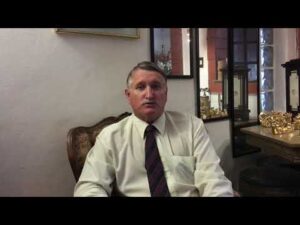
>> My name is Dirk Louw, and I am the president of the South African Korean War Veterans Association in South Africa. I have been serving for the past 4 years after being elected as a descendant to serve as the president of this association in South Africa. The South African contribution started in Korea on the 4th of August, 1950, when the South African government decided to answer the call for support for the United Nations effort in Korea, and a total of 826 South African airmen and ground crew served in Korea over this period until 1953. The first forces left by ship on the 5th of September, 1950, and over this period, a total of 36 members paid the highest price. Two of the members were ground crew, and the 34 was pilots, and then a 37th member died 8 months after returning to South Africa, due to the horrendous conditions he had to be in during his days in a prisoner of war camp. Over this period, the South African Air Force has leased aircraft from the United States, and 74 Mustang aircrafts was written off over this period, as well as five Sabres. The South African contribution over this period was highly ... Okay, I'm going to start this portion, just this portion. Over the period of 1950 until 1953, the South African forces lost 34 pilots and two ground crew, and they lost 74 of the 94 Mustang aircraft leased to the South African Air Force and five of the 24 Sabres that was leased. The South African Air Force contribution was seen as a major contribution towards the war, and the majority of the pilots were highly decorated for their efforts. Currently, I am serving as the president mainly to ensure that I look after the welfare of the members of the Korean War Veterans Association and then also to ensure that I document all the information related to the heroic deeds that these men did during the war. I have a monthly newsletter which I then produce and which I distribute to various countries, where people are that are interested in reading this newsletter. We have several functions during the year, which are related to the Korean War, but we also attend several other memorial services in South Africa, where veterans are generally remembered. In South Africa, we have three full memorial sites where the Korean names appear. One is at Air Force Base SWAT group at the memorial. The other one is at Union buildings, and the third one is in Capetown. I don't know what to say more.
>> No, that's perfect. Oh, how many are there now and ...
>> Okay.
>> ... active?
>> The current situation is that the members are getting old, and at this moment, according to my documentary proof that I have on the registry of people that have belonged to the Korean War Veterans Association, and we must please understand that there are a lot of members that never belonged to the association, but the members that are registered with me are, at this moment, 21 Korean War veterans, which consists of ground crew, as well as pilots, and then we have 19 wives, as well as 35 widows. The memorial services that are held are normally attended by myself and then one of our senior Korean War veterans, General Herb and his wife, and the Korean-specific memorials, like the Armistice Day in June, is normally attended by the majority of the veterans, as well as the majority of the descendants. So we have a huge contribution by the members on that occasion. We have several small functions during a year. We try to see where we can accommodate the needs of the members, and then as well as where there are a lot of the ... See, I can't say a lot of.
>> It's okay.
>> Okay, I can start over at this portion again. They are several small events during a year where there are associations in South Africa, like, for instance, the International Youth Foundation, which normally wants to do some dances for the veterans and entertainment, and the South African volunteers went to Korea, and they went to a country they never have heard of before, and they set foot in a country where they have never been before, and they have defended people that they've never met before. I'm proud to say today that I am very honored to be part of this association, and like one of the senior veterans said on the question why he really fought in the war, [INAUDIBLE] said that as everybody has a quest, it was their quest to help those that couldn't help themselves.
